We Celebrate Two Birthdays
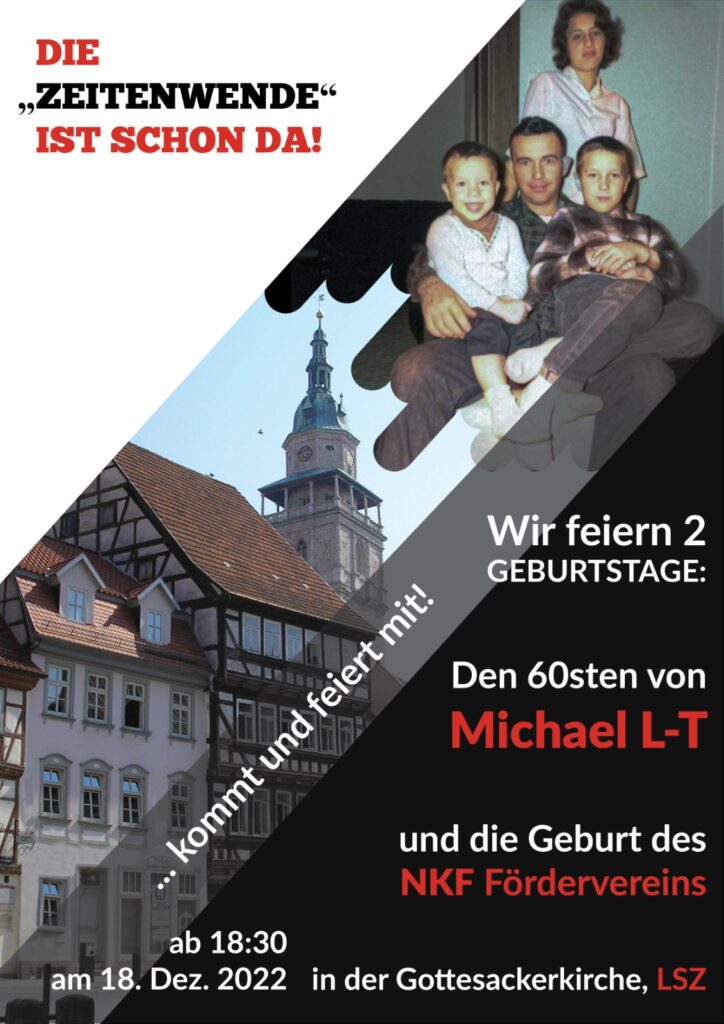
Dear friends
a 60th birthday is a fitting occasion to review one’s journey and to celebrate. To this end, I invite you a Double Bash on December 18, 2022, starting at 6:30 p.m. in Gottesackerkirche in Bad Langensalza.
On this occasion, it is also worthwhile to look ahead and think about how we can make the city in which many of you and I live even more livable. For this purpose, we have founded a foundation, which will support natural things around us, as well as art and culture in our community and thus make the future even better. Therefore, we ask you, instead of possible gifts, to support this effort with a donation. It is better to raise funds together than to get bogged down in individual campaigns.
This request does not correspond to the usual procedure in Germany, where the promotion of
charitable projects is most often carried out through programs from the federal government, the surrounding province or municipalities. Forgive me if, out of “old habit”, I behave as is customary in the USA, where local charitable projects and non-profit undertakings are realized mostly with the support of private individuals, companies and foundations.
This is the reason for the initiative which friends and I founded, “Nature, Culture, Future.” We seek to bring together as many private donations as possible for various purposes, check whether public funding is also possible, and then initiate specific projects with various actors in our own community. The guests to my Big Birthday/Double Bash are cordially invited to help with this. Perhaps you know of young talents or meaningful activities, which could not be realized so far for “lack of momentum.” Surely, you have relatives, friends and acquaintances to whom you can tell about our project and its purpose, and encourage them to join in or help; Americans can also donate to TRACES Center for History and Culture: USBank account # = [available upon request]; the routing # “should” be: [available upon request]
My first contribution will be to donate as of 2023 future income or commissions from the sale of my 25 or so published books to TRACES in the US or to our new “NKF Förderverein” in Germany. For this purpose, I intend to designate each non-profit body heir to my properties in (respectively) Saint Paul, Minnesota or in Bad Langensalza. These is one way to transfer resources to non-profit organizations; if you have a similar sentiment, I invite you to think about whether and how you want to support art, culture and nature in your community—or in my native Midwest or adopted Bad Langensalza—in the future.
I am looking forward to our get-together, on December 18th and beyond!
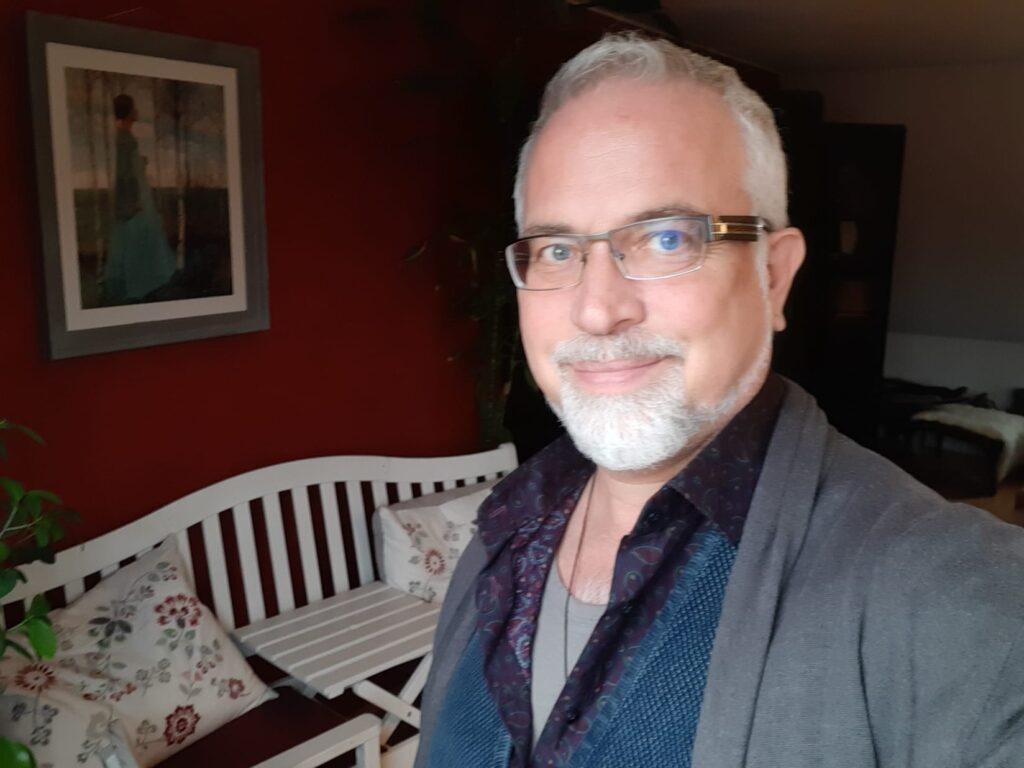
Michael’s Tip for Local History
Buffs in the Thuringian Basin Valley:
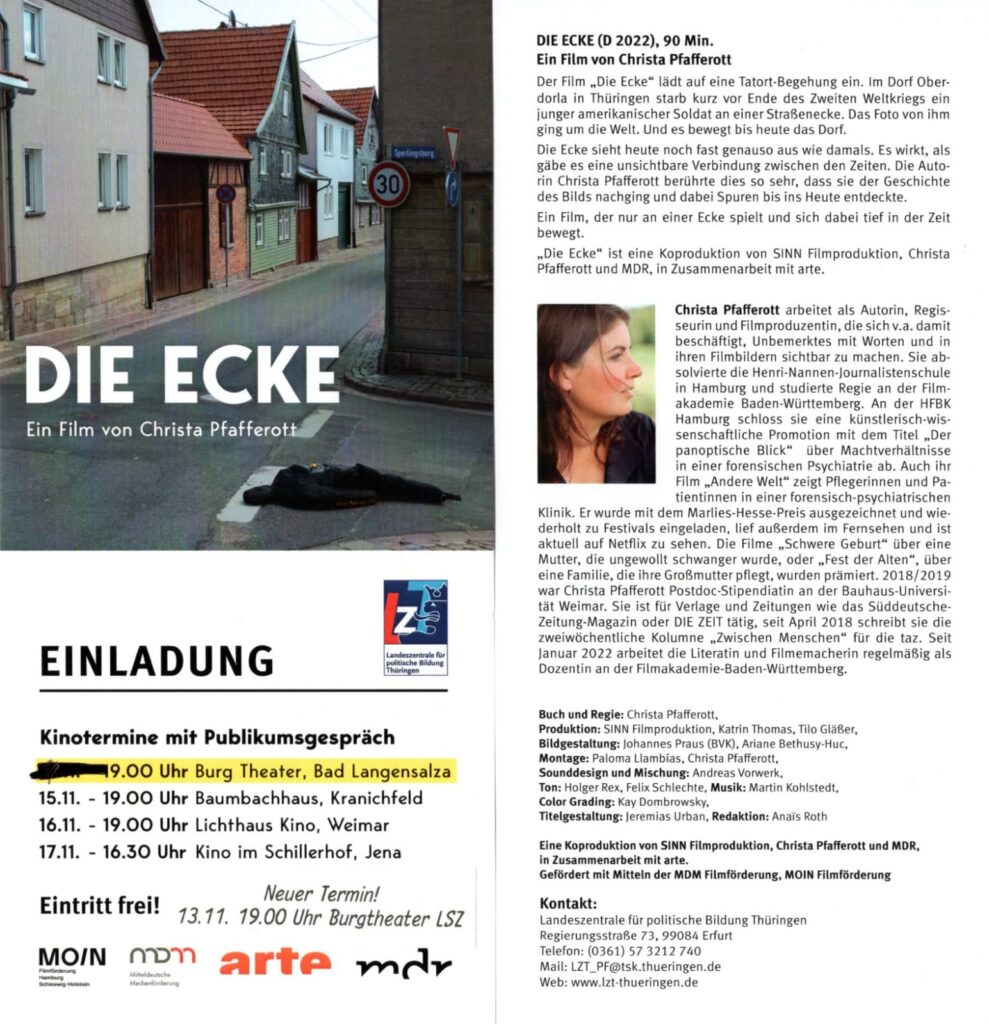
On Friday evening, I attended a screening in Oberdorla of “The Corner,” a documentary about the culture of remembrance [including but not limited to that community] of the April 1945 shooting of an American soldier, Robert Wynne of Texas, then 19. Even as a historian who has focused on this period for decades, I was surprised at how much I was touched by the content of the film and the filmmaker’s unique ability to tell the story through interviews and even still images. I HIGHLY recommended my fellow citizens to go to the Burgtheater cinema (Bad Langensalza) on Sunday evening, November 13, 2022, not only to see a local screening of the film, but also to meet the filmmaker Christa Pfafferott, who is supported by Arte and MDR.
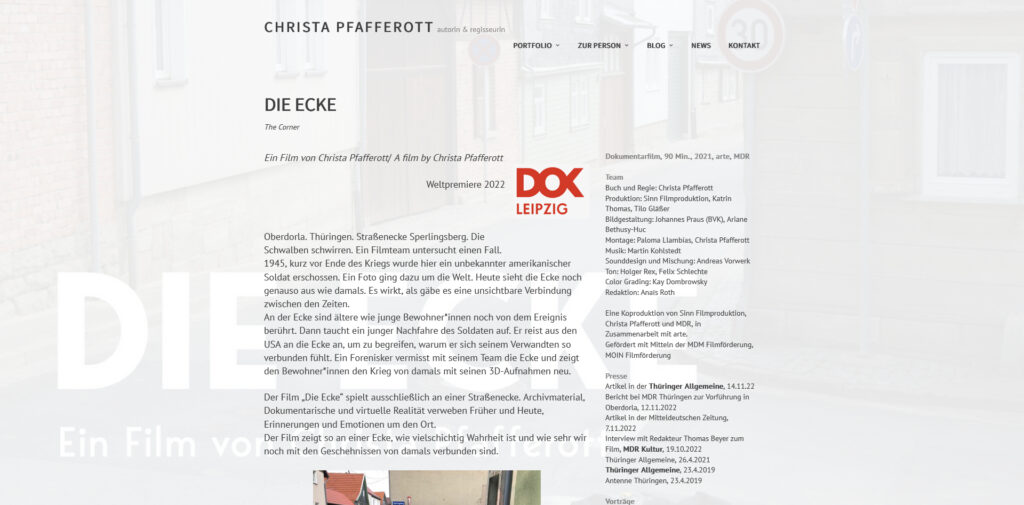
Haus der Spuren during
2022’s Autumnal Season
Over the current autumn, the Haus der Spuren team has continued realizing historical projects which started last year. During this period, two interns have dealt with the tasks and obligations of their assignments. Specifically, Freddie, an American student from West Virginia, has supported these efforts by researching, writing and designing exhibit panels. Ιn addition, he’s assisted in the administration of the museum. Concurrently, Evangelos, a Greek student from the island of Crete, has expanded the project’s social-media presence on websites like Tripadvisor, Historypin and Facebook. Furthermore, both have supported the maintenance of Haus der Spuren’s WW2-era archives, plus other seasonal jobs.
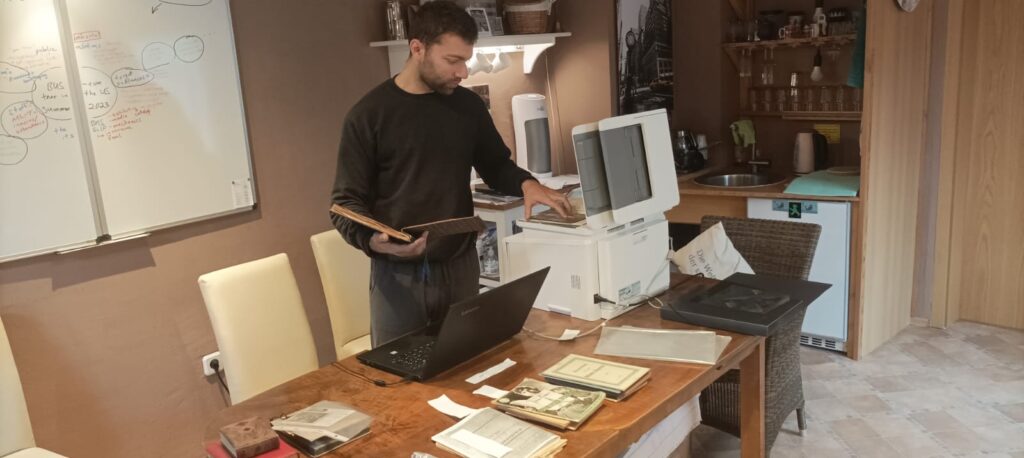
Global Salon Currently
as a 10-Week Series:
“Germans and ‘Amerika’”
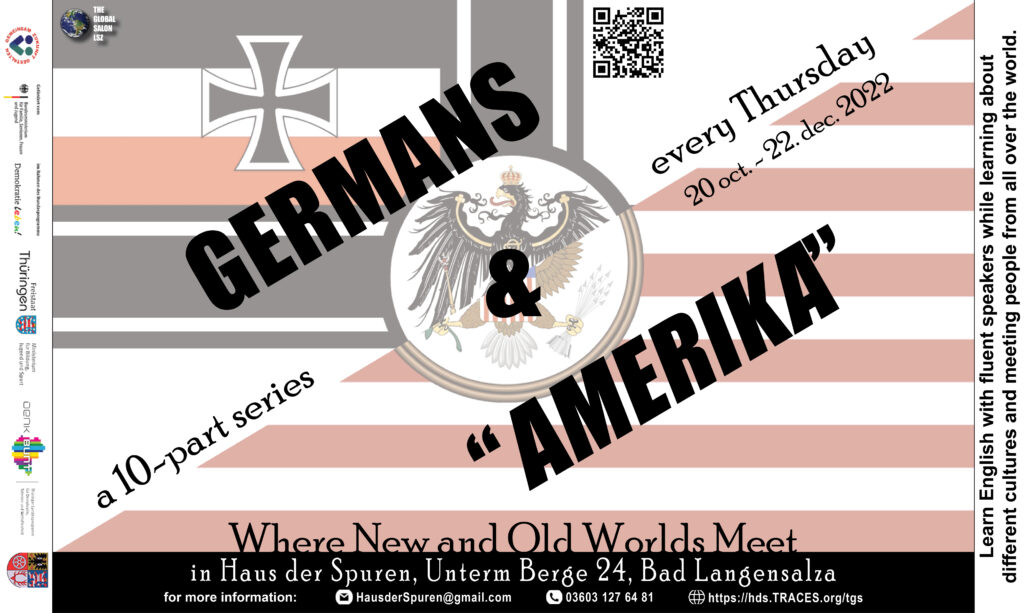
In the small town of Bad Langensalza, every Thursday the historical “traces” of relationships between Germans and Americans provides the material for a 10-week series. It is true, for example, that more than 20% of Americans have ancestors from Germany. The Germans brought many traditions to the US that people don’t often realize were from Germany; in turn, German immigrants largely adopted American culture. Of course, this exchange between Americans and Germans was not always smooth (especially during periods of war, as suggested by our use of the WWI-era German military flag in our flyer); at the same time, this process helped to form modern American society. For that reason, we believe that researching the historical relations between the two nations is very important, in order to explore our common past. Furthermore, our lessons are a good chance for locals to learn English with fluent speakers, while learning about different cultures and meeting people from all over the word. So, don’t hesitate to join us every Thursday at 17:00 in Haus der Spuren, through 22 December!
A Returned Jew Reflects at 90
on Her Two Lives in Germany
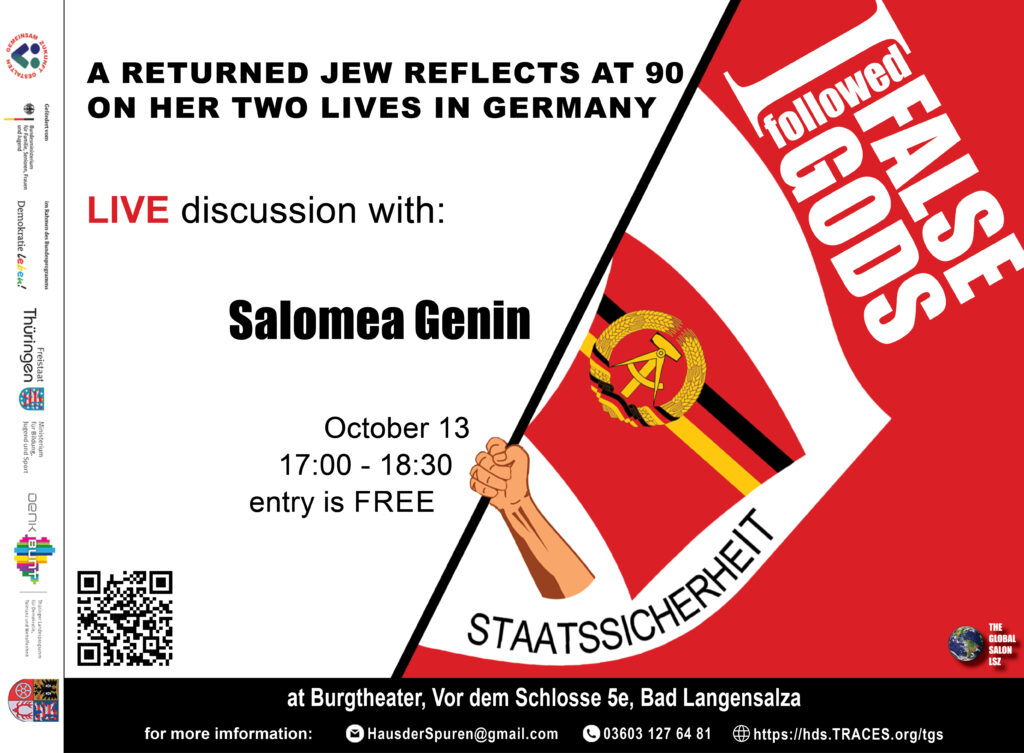
Perhaps the old saying is true, that humans are more objective in dealing with their past acts after the passage of time. In this context, Salomea Genin, a returned Jew who fled the Third Reich as a child, then lived in East Germany since the 1960s, has written an book about her experiences of exile and of her later life in DDR, in her book “I Followed False Gods.”. Furthermore, the ninety-year-old Salomea, currently, is currently working on English-language versions of her books and accepts invitations to speak about her experiences. This past October, Salomea visited Bad Langensalza via Zoom and led a Zoom-live discussion about her experiences during those two turbulent eras.
Volunteers Leave TRACES
after One Year of Work
On September 1, 2021, Anja Sofie Kleemann and Leonie Vanessa Sachse began a voluntary social year of culture (a programme in Germany called Freiwilliges Soziales Jahr Kultur) at Spuren e.V. in Bad Langensalza and TRACES. For one year, they performed valuable work for the association, which spanned across various areas of activity: from the archive, to press and public relations, to administrative tasks, as well as accompanying the first History Mobile round trip.
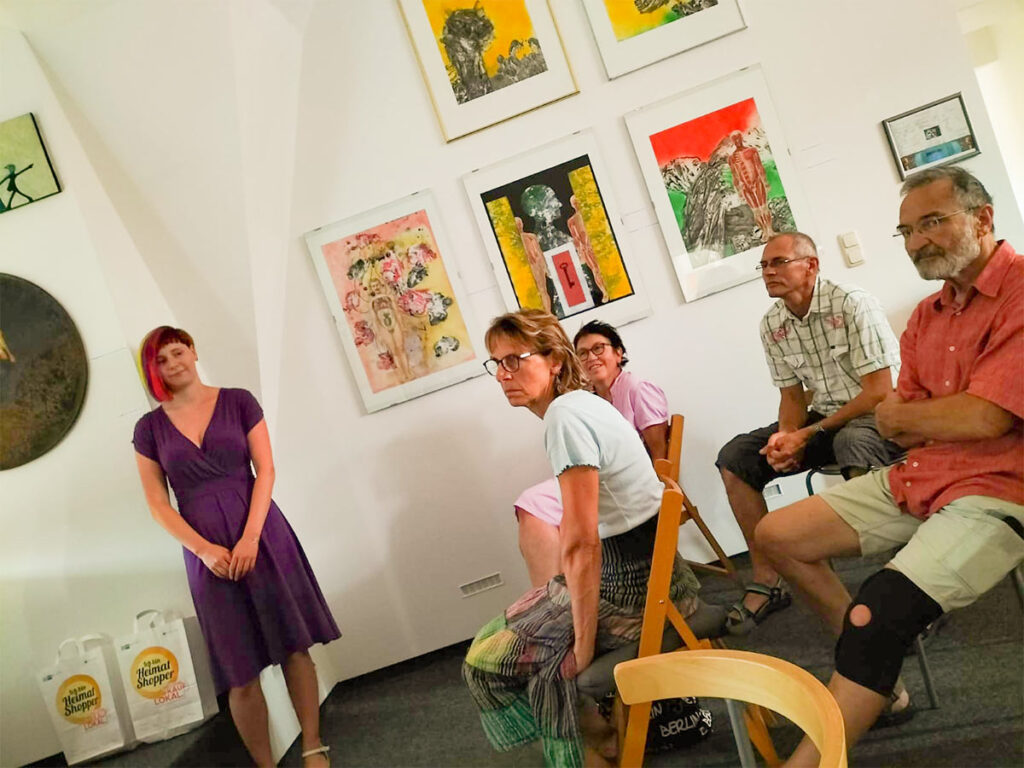
Before the end of their service on August 31, 2022, the two gave a presentation at the Global Salon LSZ on August 25, sharing experiences, challenges and highlights of their volunteer service. Afterwards, certificates as well as farewell gifts were presented and last but not least, the volunteers had a fantastic farewell party with colleagues and friends they met during their service.
Click here to watch the presentation

Traces of Democracy’s Path in Unstrut-Hainich-Kreis,
from Herzogs via Hitler and Honecker
Bringing non-Germans closer to the history and culture of remembrance surrounding (world) wars – that’s what happened this summer during the “Monumental Talks” project in and around Bad Langensalza. The participants joined us on a tour to local memorial sites and talked not only about the historical facts, but also about the social background and the effects of those events to this day. In the grove of honor in Kirchheilingen, we heard exciting reports from Hartmut Dölle, chairman of the local heritage association, accompanied by historian Nora Hilgert. In Merxleben, we were able to experience the culture of remembrance live thanks to the Welfenbund and the great local community of Merxleben, who welcomed us warmly!
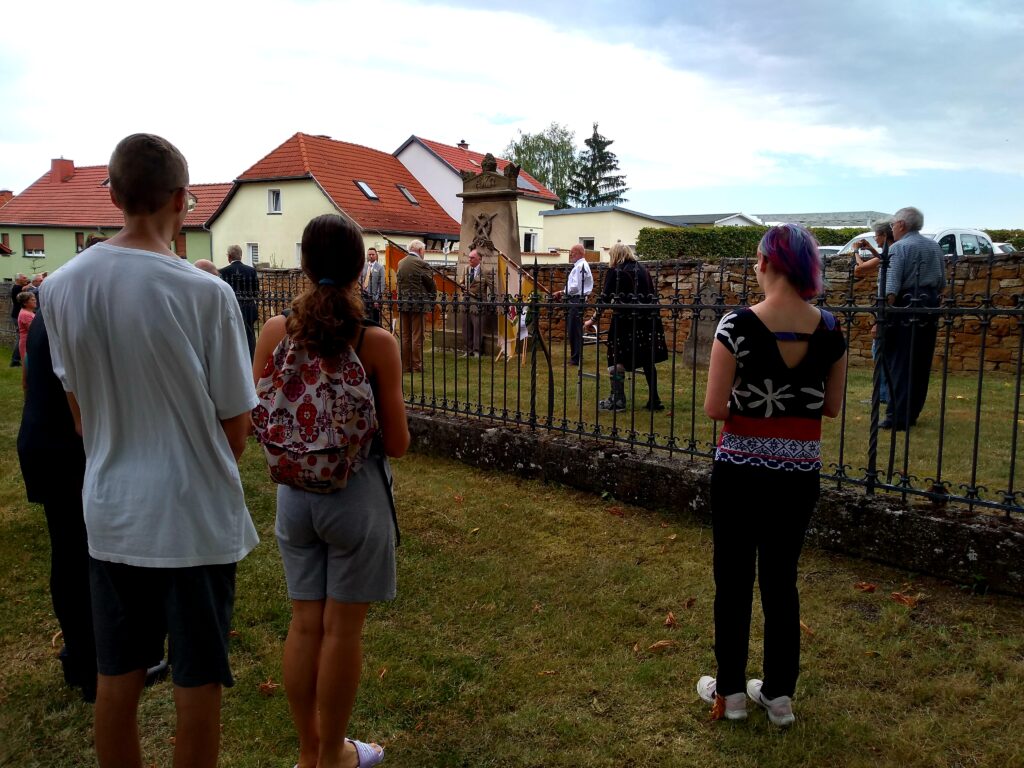
Trip to Gotha
On August seventh, a sunny Sunday, the association’s director Dr. Michael Luick-Thrams took the TRACESpuren team and friends of the organization on an excursion to Gotha. There they were kindly given a guided tour of the grounds of Friedenstein Castle and the city center by associate of the Gotha Research Center at the University of Erfurt, Dr. Dirk Jacob Jansen. After that, they had lunch and then paid a visit to the impressive castle museum.
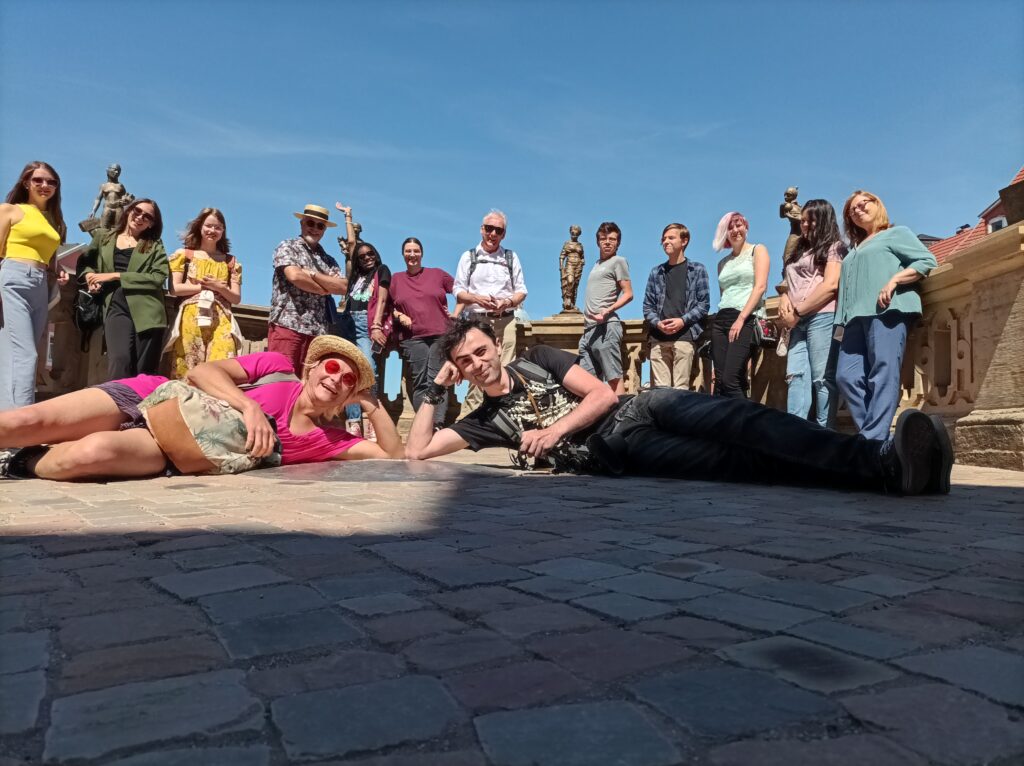
Farewell Party in Honor of
TRACES Volunteer Eloïse
While still being fairly young, the Haus der Spuren (“House of Traces”) has so far welcomed dozens of (mostly international) volunteers. They brought and continue to bring a breath of fresh air and exciting new ideas to Spuren e.V. and TRACES. One of these volunteers is Eloïse from France. She was working with us for two months as part of her internship for her university in Lille. The young student has supported us greatly in administrative and organizational tasks as well as during our tour with the History Mobile. Apart from her diligence, she also fascinated us with her open and warm nature. Thus, the team was sad when her internship was coming to an end. So, to give Eloïse a proper send-off, we threw a goodbye party on her last evening at Haus der Spuren including dinner, a home-made cake and a bonfire. We hope to see her again soon, maybe even next year during TRACES’ 2023 BUS-eum tour in the US!
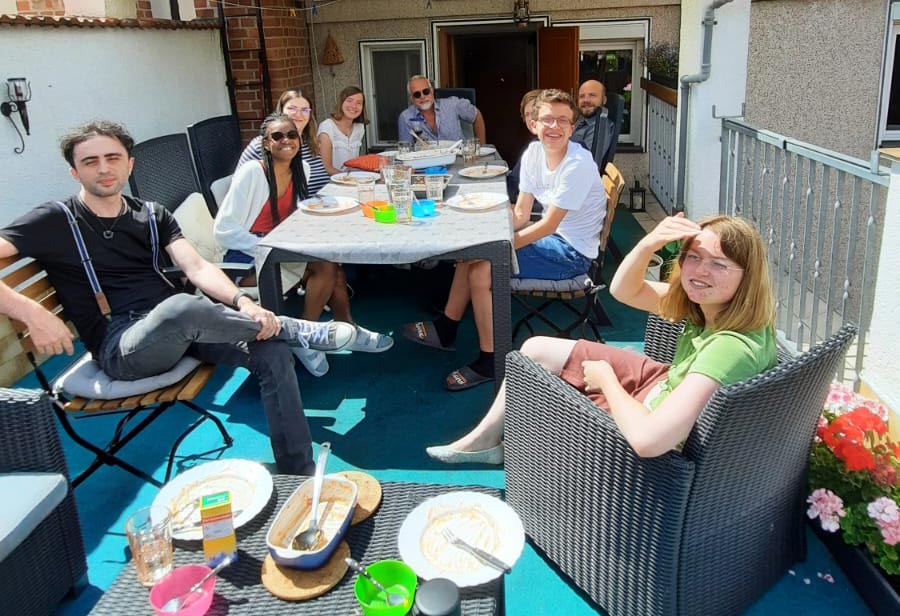
Haus der Spuren Completes More of Its Exhibit
and Celebrates a Day of Open House

On Thursday, July 7, 2022, the Haus der Spuren held its day of the open house. From 3pm-5pm, the exhibit was open to anyone who wished to visit. The team was happy to answer any questions and offered coffee and cake to the guests. At 5pm-7pm there was a guided tour of the exhibit in English as part of the “Global Salon LSZ” project. Celebrated that day was the completion of part of the exhibit with photos from Bad Langensalza in 1954, showing a parade on May 1 and completing a mural in the reception room that already features images from the 1920s and 1940s. With these new photos, the Weimar Republic period, the Nazi period, and the time of Soviet socialism are now represented, and thus three different systems. Many visitors were thrilled by the never-before-seen photos, as well as by the rest of the exhibit. In the evening, the Spuren team let the successful day come to an end together.
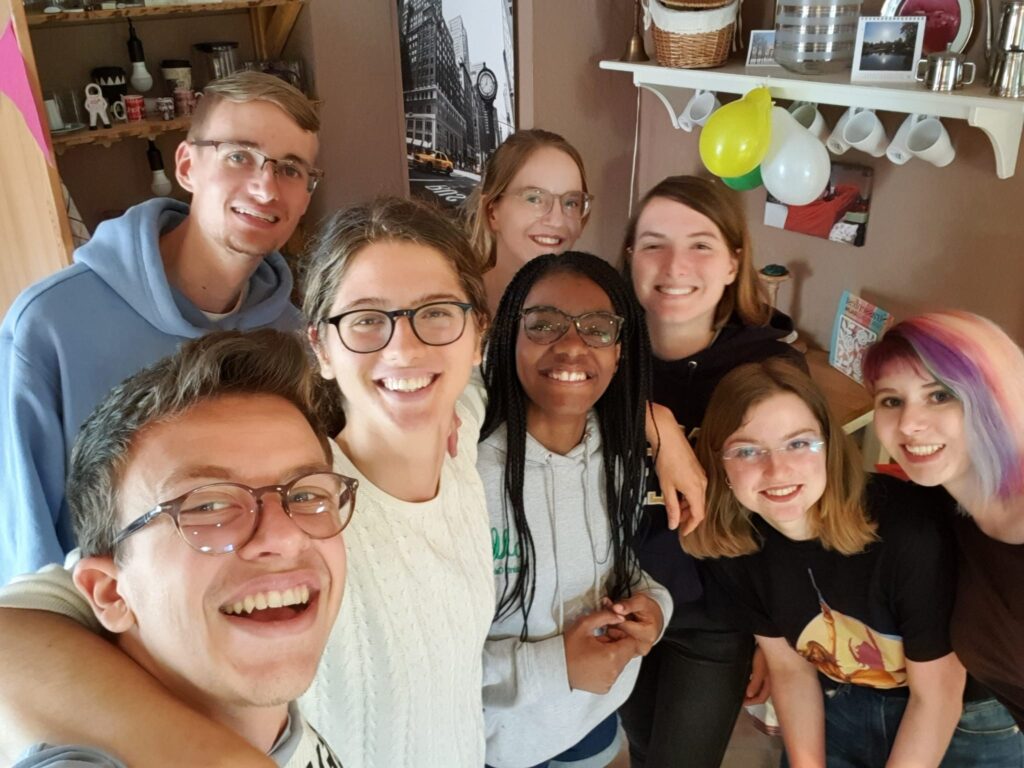
Foreground, from left to right right: Achille, Claudia, Laurie, Leonie, Anja
“Zukunft LSZ” Discusses the Cultural Future
of Bad Langensalza with Maren Krings
On Tuesday, 5 July 2022, the Spuren e.V. director Dr. Michael Luick-Thrams invited to an event at the “Center for Art and Humanity” as part of his project “Zukunft LSZ”, which started on June 3, 2022. Co-organizer was the investigative photographer Maren Krings, who had moved away from Bad Langensalza years ago. “Zukunft LSZ” wants to make Bad Langensalza more cultural and lively and encourage people to move back to the city. Interested citizens were invited at noon to talk about the cultural future of Bad Langensalza and to exchange ideas about possibilities and concrete plans. In the evening, there was a friendly get-together and joint dinner (“pot-luck dinner”) with intercultural exchange and exciting stories about what Maren Krings has experienced on her travels. Michael, himself a cultural actor in Bad Langensalza, would like to continue the project for a long time and build up a sustainable strong cultural scene that can attract people from near and far to the spa and rose city.
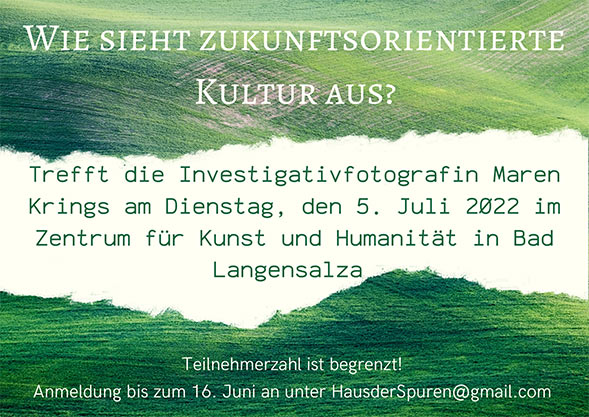

Contemporary Witness Talks about
the Civilian Internment of Germans in America
The work of Spuren e.V. focuses, among other things, on German-American history shortly before, during, and after World War II. One aspect of this shared history is the civilian internment of Germans and German-Americans in America. To create more awareness of this topic, we invited Karin Schramm, a member of Spuren e.V. and a contemporary witness from Hamburg, to Bad Langensalza at the end of June 2022. We visited schools in the Unstrut-Hainich district as well as Erfurt with her, where she told her story.
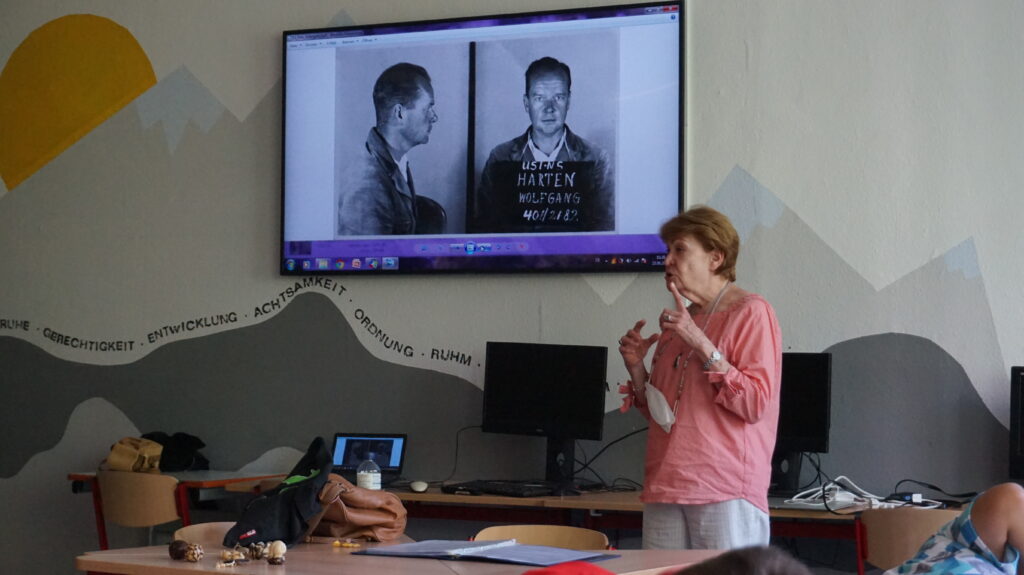
Schramm’s parents were Germans who moved from Germany to Ecuador several years before the war began and later started a family there. After World War II broke out, people of German origin were considered enemies in America. Thus, many of them, whether they approved of National Socialism or not, were locked up in internment camps. Among the internees were Karin Schramm, her siblings, and her parents. During her visit here, she told several school classes about this time and also presented as a guest speaker at Spuren e.V.’s Global Salon LSZ.
This is an introduction to the topic written by herself:
„I was born on November 16, 1943, in Cuenca / Ecuador as the 3rd child of German parents. After the outbreak of World War II in September of 1939, my parents could still spend some calm years in Ecuador, but in April of 1942 things became difficult for Germans living in Ecuador. Most of them were deported back to Germany. Since my mother fell very ill with malaria before my brother was born and almost died during childbirth, she was not transportable. Thus, they had to stay in Ecuador alongside a few other Germans. They were, however, resettled from their home in Manta on the coast to Cuenca in the high Andes because they were considered “dangerous spies”.
Karin Schramm
On December 23, 1943, so a little over 4 weeks after I was born, my father was picked up by American as well as Ecuadorian military policemen. They first took him to prison and on December 25 to an unknown destination. My mother had been left behind with three little children…
I want to tell the story of our time in the internment camp of Crystal City, Texas now so that this side of the 2nd World War, which was previously unknown in Germany, can also be made public here.”
Karin Schramm’s and Spuren’s June collaboration was crowned with success. Her story is not only highly informative as part of a chapter of important world history but at the same time personal and touching.
Spuren e. V. Takes Part in Thuringian Research Project
On the first of June 2022, the Haus der Spuren („House of Traces“) was visited by Henrike Katzer from the University of Jena and Christoph Henning from the University of Erfurt. The two researchers came to conduct an interview about the practice of sharing as part of a social science project. For this purpose, they asked then volunteers and interns of Spuren e. V. as well as a resident of Haus der Spuren from Ukraine questions about why they are here and what they do here. They talked about their life together in the community and about the rules of the house.
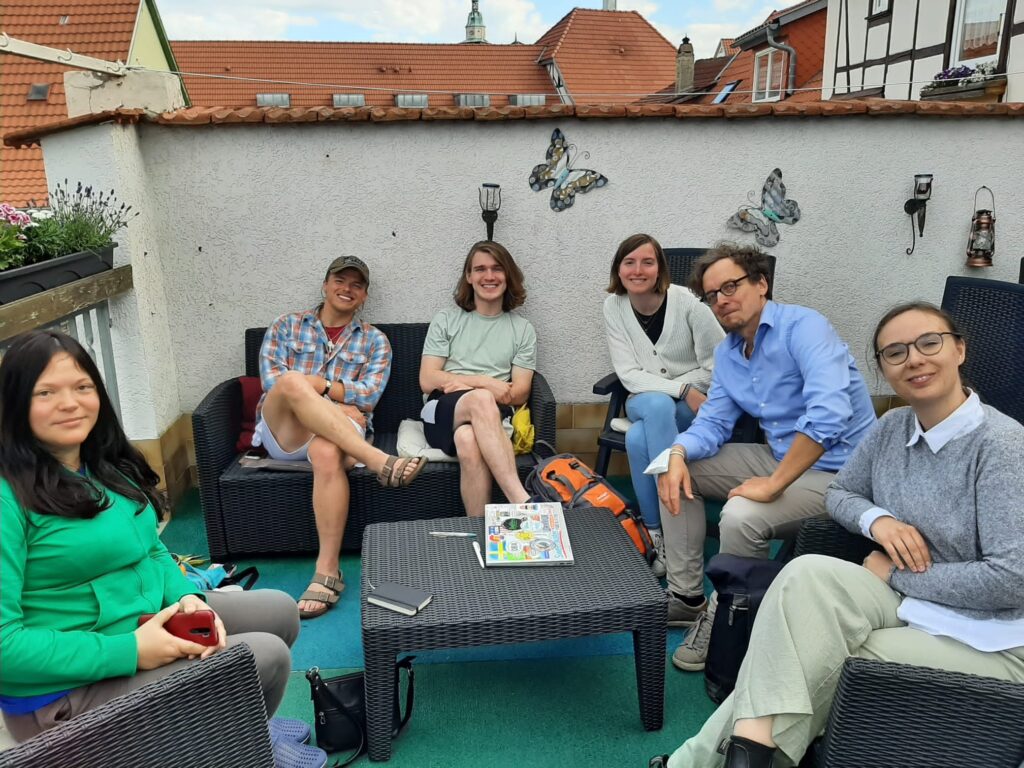
Spuren e. V. was happy to be part of this exciting research project.
Spuren e.V. Cooperates with Local Schools
On Tuesday, 31 May 2022, two 10th grades of the Regelschule Mühlhausen visited the Haus der Spuren. Dr. Michael Luick-Thrams, the director of Spuren e.V. and Stefan Schuchardt, the director of the city museum in Bad Langensalza, divided the group and the students worked alternately in both exhibits. There they learned a lot about Germany, especially Thuringia, at the end of World War II.
On Monday, 11 July 2022, a 9th grade class from the Regelschule Weberstedt came to the Haus der Spuren for a project day on the topic of prisoners of war and forced labor. In the exhibit, the students were presented with unique stories and experiences. Two days later, on Wednesday, July 13, 2022, Dr. Michael Luick-Thrams visited the class at school to further explore the topic.
The students were given a perspective on the postwar period that they could not have experienced in the classroom.
Spuren e. V. Cooperates with the University of Erfurt
In spring 2022, director of Spuren e. V. Dr. Michael Luick-Thrams once again lectured at the University of Erfurt as co-leader of two StuFus. The StuFu (Studium Fundamentale) is a compulsory program at this university for all Bachelor students and serves to enable them to acquire practical content that goes beyond that taught in their subject studies.
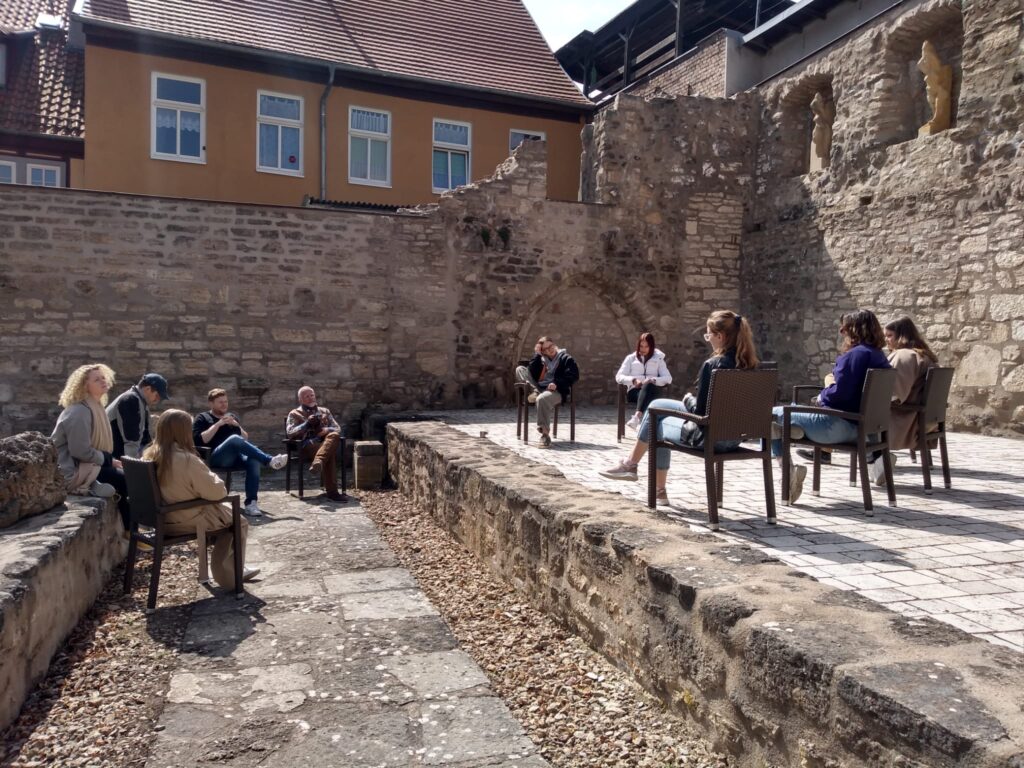
One was titled „A Refuge for the Muses: How to Build Your Own Museum, IN REALTIME“ and aimed to give participants a behind-the-scenes look at museum work. To co-direct, the historian brought on board Stefan Schuchardt, director of the Bad Langensalza City Museum and Pharmacy Museum, so that participants could learn about various museum facilities. The Other ran under the name „How to Transform America: Going On-Tour to Shift Attitudes in the US about Climate Change“ and took place in cooperation with Professor of Medieval History Dr. Sabine Schmolinsky. The students who took this StuFu helped prepare for the 2023 tour of the Midwest in the US with Spuren’s sister organization TRACES‘ BUS-eum. (More information about the BUS-eum is available here: TRACES).
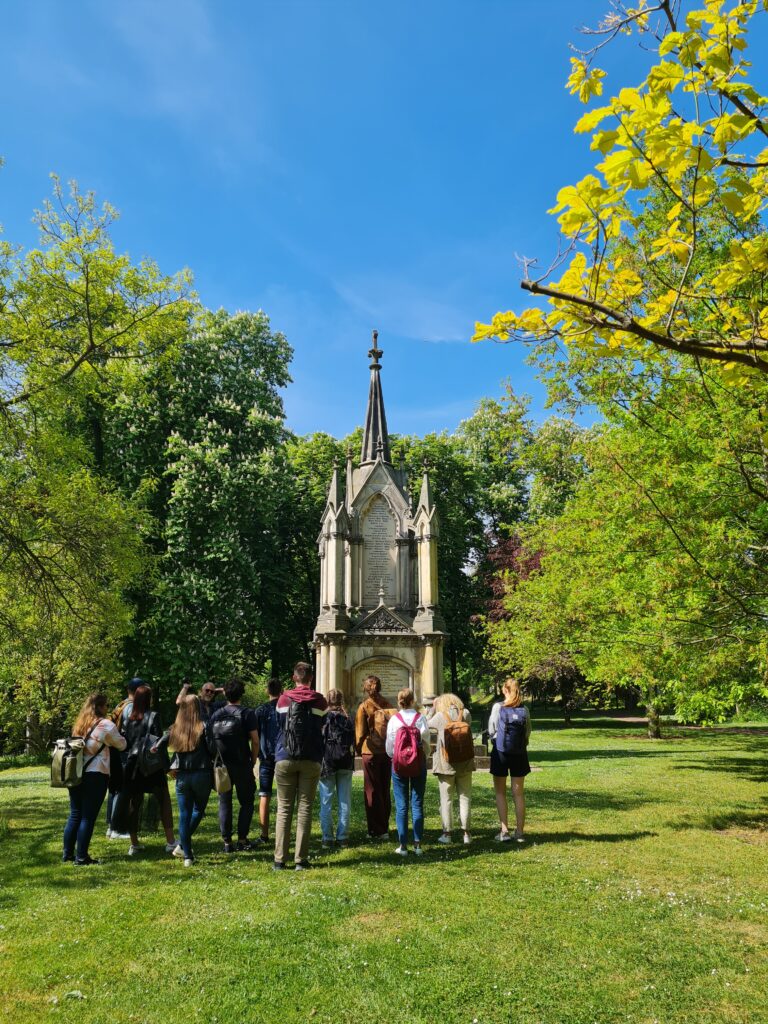
In addition, Mr. Luick-Thrams appeared as a guest speaker at Christopher Forlini’s StuFu „Oral/Aural Practice: American English“ and spoke about his native Iowa as „the ‚real‘ America.“
Spuren e.V. Presents
Thuringian Social History at the
“Green City Center Festival”
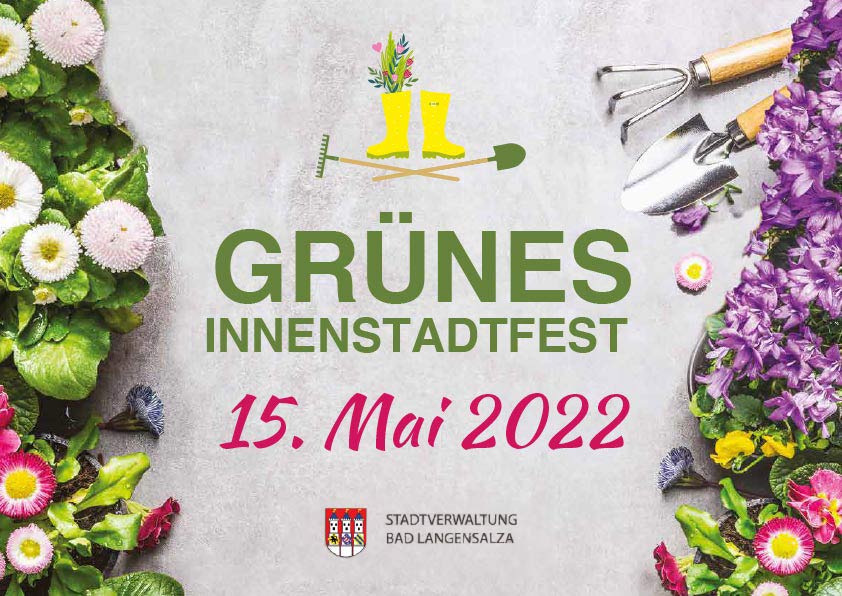
On Sunday, May 15, 2022, the “Green City Center Festival” took place in Bad Langensalza. There was a colorful day program and many actors from the city presented themselves and their organisations with various stands. The organisation Spuren was also present with the History Mobile and volunteers. Thanks to the stand being located directly in front of the City Museum, many guests interested in history came by to see the “Museum on Wheels” and many fascinating conversations about the post-war period in Thuringia and the personal stories of the people arose. In the afternoon, the reigning “Rose Queen” Melanie visited the History Mobile, looked at the exhibit and wrote some nice words in the guest book. The day was a great success for Spuren e.V. with many encounters. The organization was thus able to further expand its visibility in the city.

“Demokratie Leben!” Supports
Spuren e.V.’s School Projects
On Friday, 1 April 2022, Spuren director Dr. Michael Luick-Thrams was at the handover of the grant notification from our sponsor “Demokratie Leben!” Spuren e.V. was awarded 10.000€ of funding for its project “Democracy in danger: from Hitler to Honecker – local and global perspectives on Unstrut-Hainich”. In the course of this project we want to go to schools and talk to the students about practical democracy, Thuringian social history and the coexistence of people from different cultures. To do this, we are bringing guest speakers from around the world to Bad Langensalza to share their unique stories. We thank “Demokratie Leben!” for their trust in our project and the generous funding!
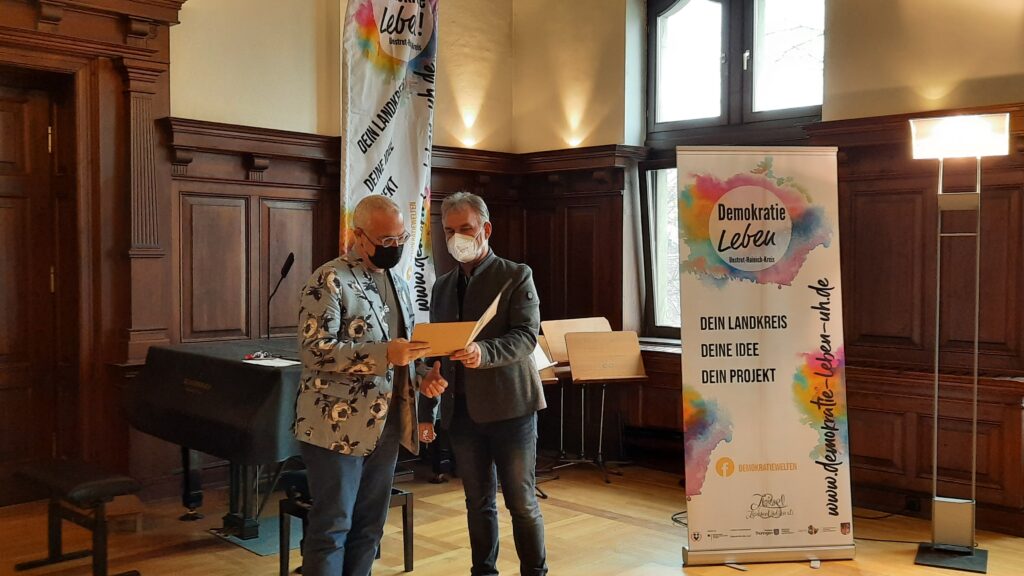
Bad Langensalza Aid Project Takes in Refugees from Ukraine
Dr. Michael Luick-Thrams, director of Spuren e.V. in Bad Langensalza, bought a house on 24 March 2022. On 29 March, a family of eight who had fled Ukraine moved in. Within just two weeks, the house was completely renovated, equipped with furniture and made ready to move in. With the help of numerous volunteers from Bad Langensalza and the surrounding area, the empty house was able to become the refugee home Phyllis-Thrams-Luick-Haus in a very short time. Michael follows the example of the Scattergood Hostel, which was opened by Quakers in Iowa at the time of the Second World War and took in a total of 185 refugees from Europe. For the duration of the Ukraine war and thereafter, this house is intended to provide refuge to those fleeing war and suffering. In the next few days, more Ukrainian refugees are to come to the house and we hope that they will settle in well in the Phyllis-Thrams-Luick-Haus and in Bad Langensalza.
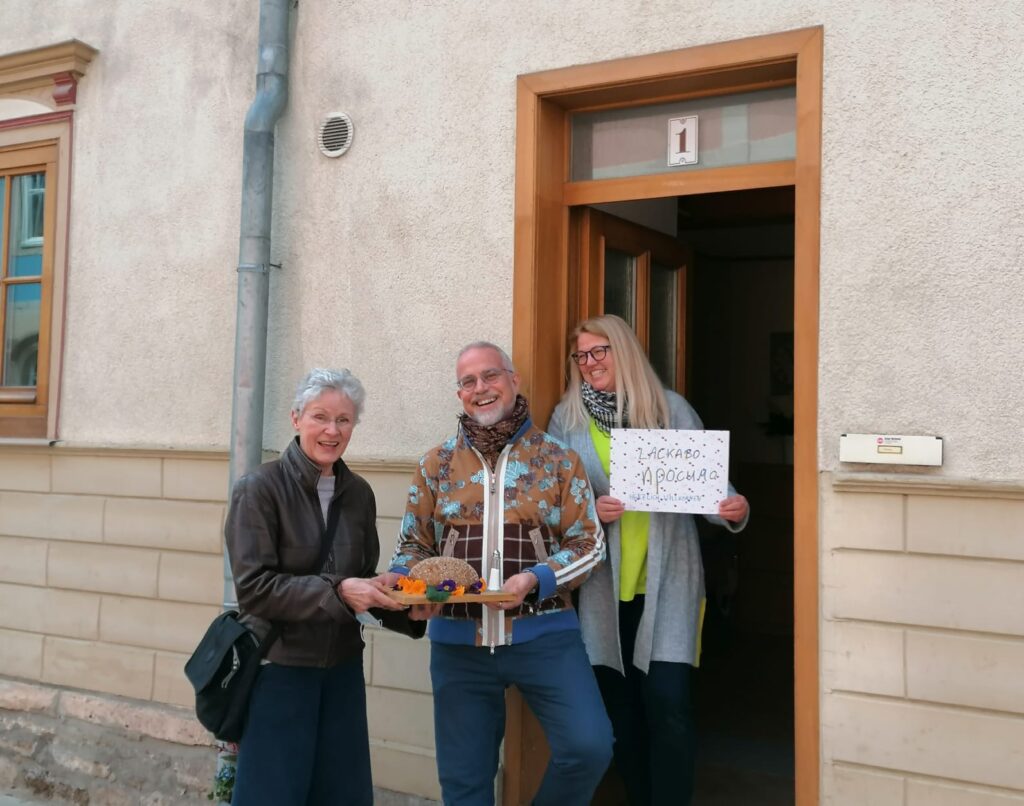
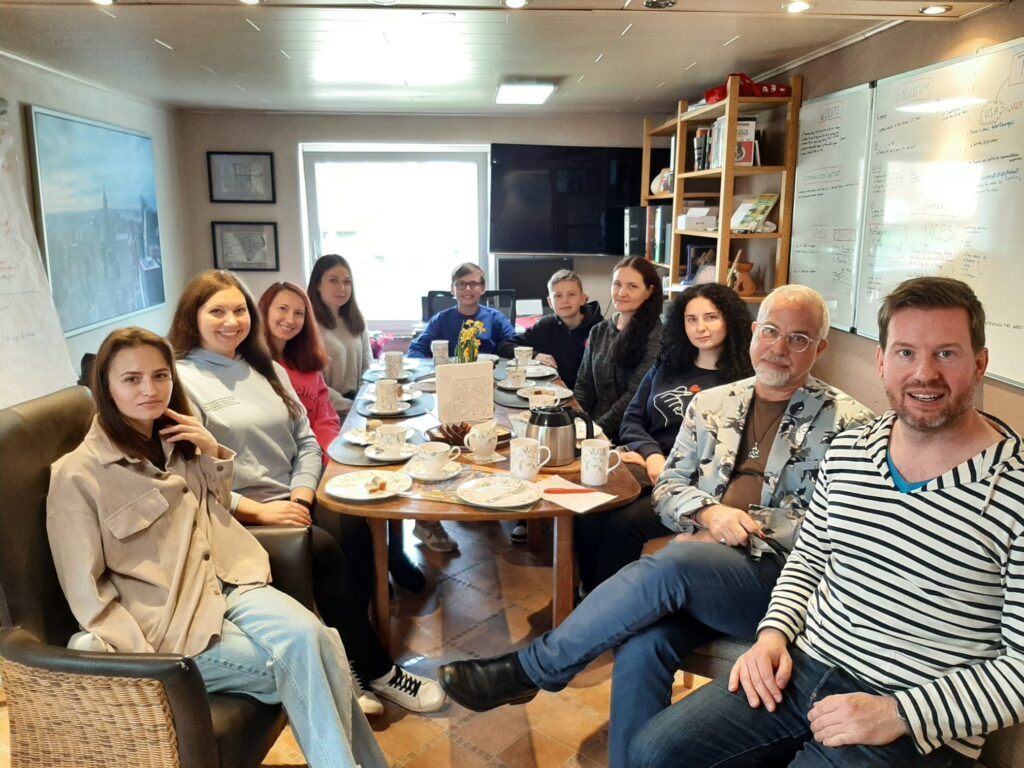
right: Some of the Ukrainians who live/have lived in the Phyllis Thrams-Luick-Haus as well as friends and helpers of the association: (from left to right) Olga, Anna, Iryna, Iryna, Kirylo, Igor, Oksana, Maria, Michael & Christian
Native American Talks with Pupils at Salza-Gymnasium
On Friday, 18 March 2022, Kevin Manygoats, a Native American from the Navajo tribe (they call themselves Diné), visited Salza-Gymnasium. First he visited an 8th grade, then a 5th grade and introduced them to the history and culture of the Native Americans, especially that of his tribe, at a student-friendly level. The children were curious and learned a lot of new things. We hope to do more projects with Kevin in schools soon.
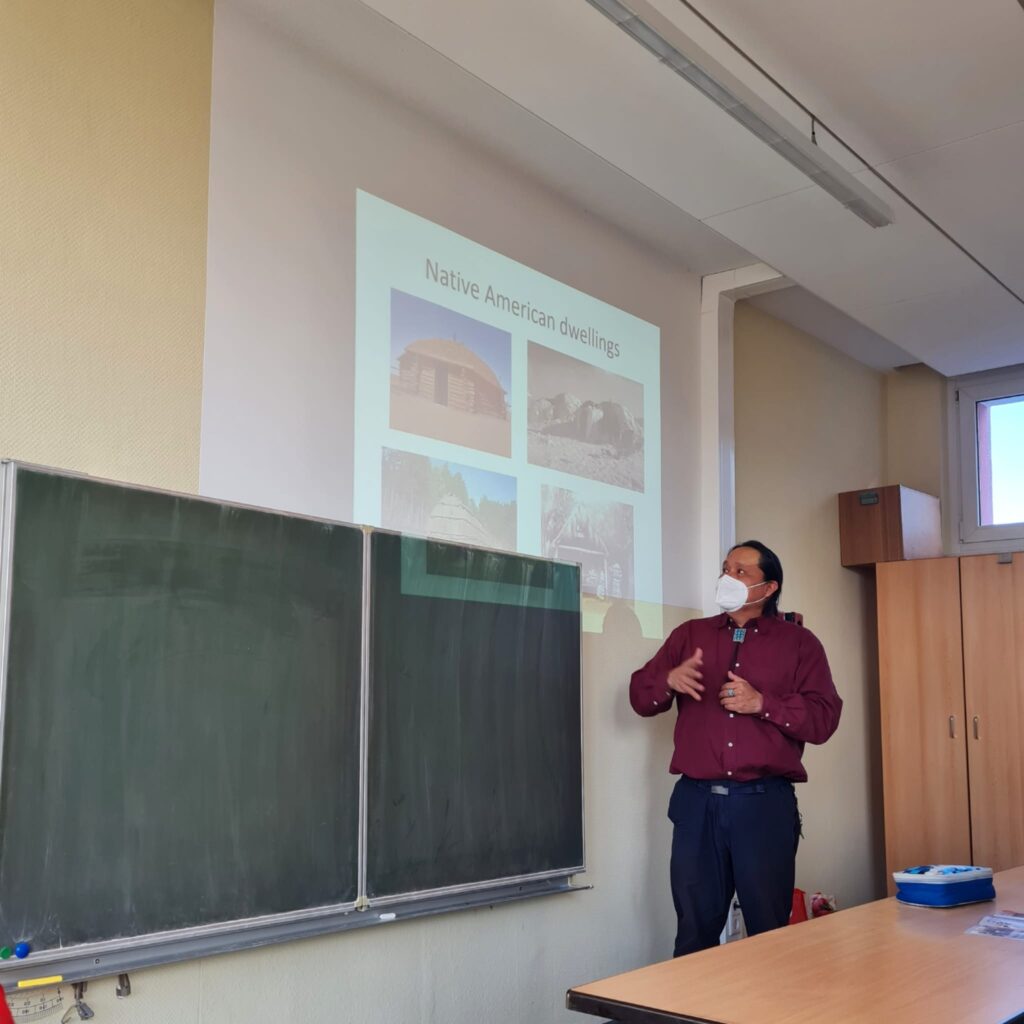
Global Salon LSZ:
Native American Kevin Manygoats
Gives Guest Lecture in Bad Langensalza
On Thursday, 17 March 2022, Kevin Manygoats, a Native American from the Navajo tribe (they call themselves Diné), visited Bad Langensalza. At the Global Salon, held this week at the Burgtheater, he spoke about the history and culture of native Americans. The audience was enthusiastic and had many interested questions. The event was a resounding success and brought some new people to the Global Salon. We would like to welcome Kevin back to Bad Langensalza soon!
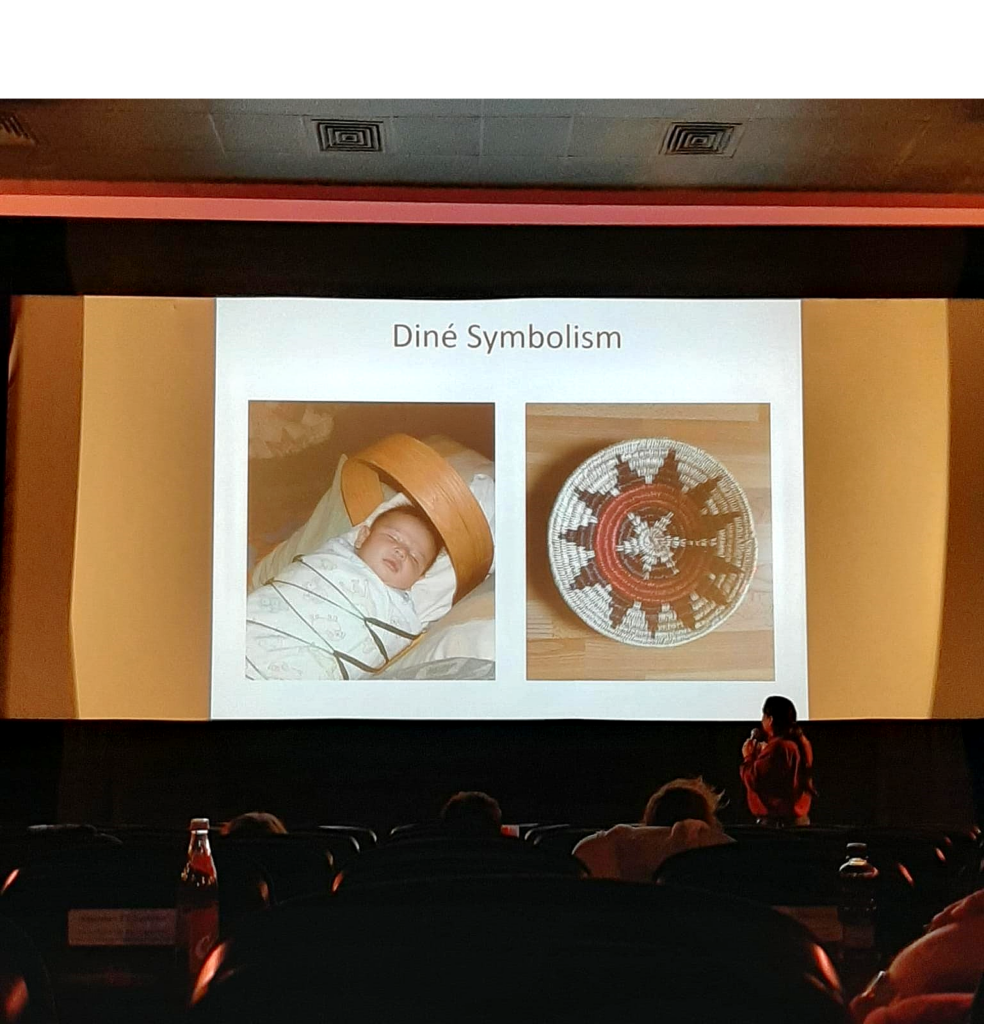
Commitment to Peace:
TRACES Members Demonstrate in Washington DC
On Sunday, 27 February 2022, TRACES Director Dr. Michael Luick-Thrams (front row, left of banner, wearing sunglasses) and his volunteer Anja (with purple hair) were part of a demonstration in front of the Russian Embassy in Washington DC. Together with Quakers from the surrounding area, they campaigned for peace and against the war in Ukraine. It was moving how many people from different backgrounds worked together for this important cause. We want to send a clear signal: what is happening in Ukraine is wrong, and although we are non-partisan and apolitical, commitment like this is important and an essential part of our philosophy.
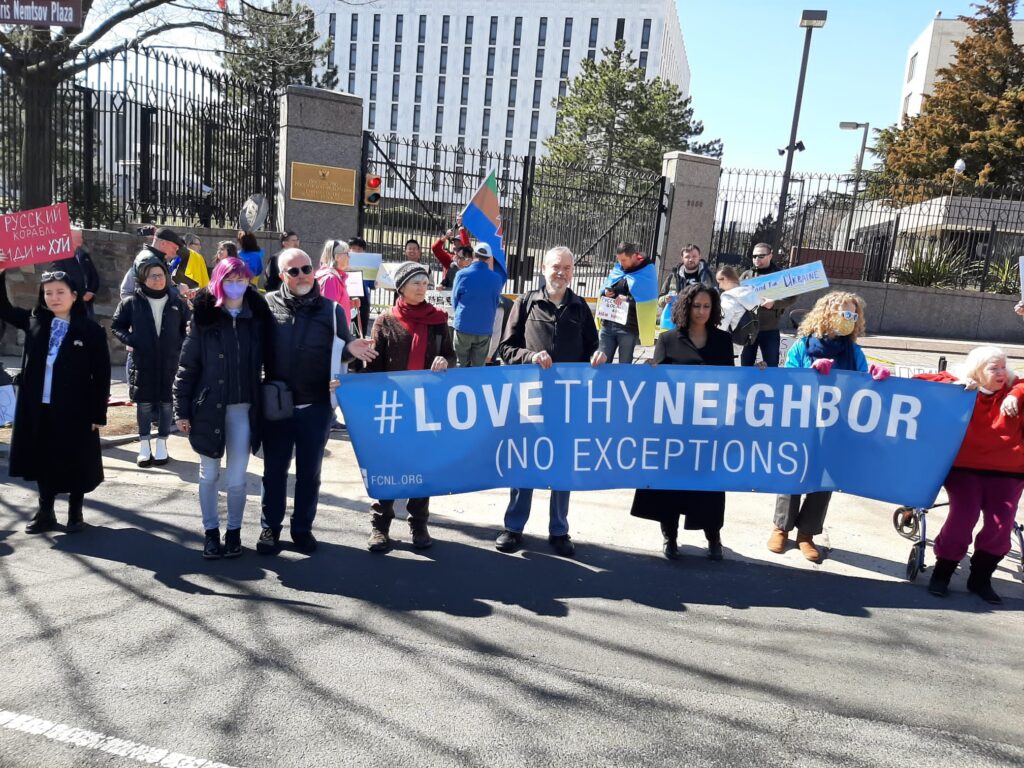
The Inspiring Story of Scattergood Hostel: 1939-43
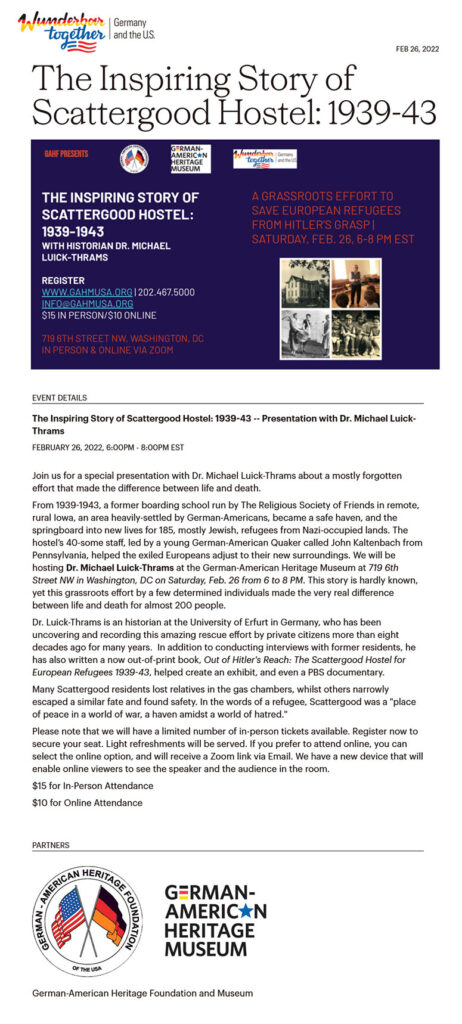
Presenting in the US:
Out of Hitler’s Reach:
The Scattergood Hostel
for European Refugees
Throughout February 2022, Dr. Michael Luick-Thrams, accompanied by his FSJ volunteer Anja, traveled around America giving lectures on the Scattergood Hostel, a little-known Iowan safe haven for refugees of Hitler’s Nazi regime. On 23 February 2022, Michael visited the Princeton Friends School, a Quaker day-school in the woods of Pennsylvania for Pre-K through 8th grade students. Michael’s talk was particularly relevant to these students as the hostel was created at the site of an abandoned Friends boarding school and operated by about 40 Midwestern Quakers and college students. Then, on 26 February, Michael presented at the German-American Heritage Museum of the USA in Washington, D.C. People who could not attend this event in person had the opportunity to join via Zoom. Attendees learned about the 185 refugees housed at the hostel, and heard details from interviews with some former residents. The hostel was also the focus of Michael’s now out-of-print book Out of Hitler’s Reach: The Scattergood Hostel for European Refugees, 1939-43 and a PBS documentary, which Michael embedded into his presentations.
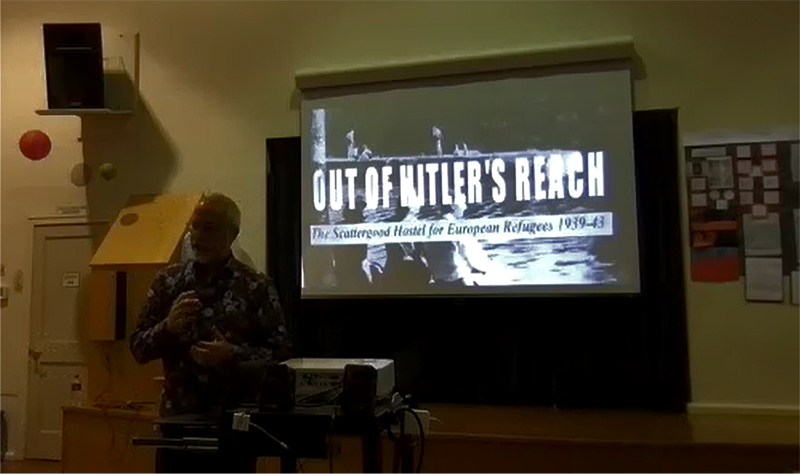
Video: Scattergood Hostel: 1939-1943, Lecture by Dr Michael Luick Thrams, Washington DC, USA
Global Salon LSZ:
“Reporting to you ‘Live from New York’!”
On Thursday, 24 February 2022, the Global Salon LSZ met again for our free weekly English conversation course. We were pleased to welcome new participants while Dr. Michael Luick-Thrams (US-American), his FSJ-volunteer Anja (German) and his future Workaway-volunteer Marissa (US-American) reported to us live from the States via Zoom. They introduced the Big Apple and shared with us their personal experiences getting to know this fascinating metropolis!
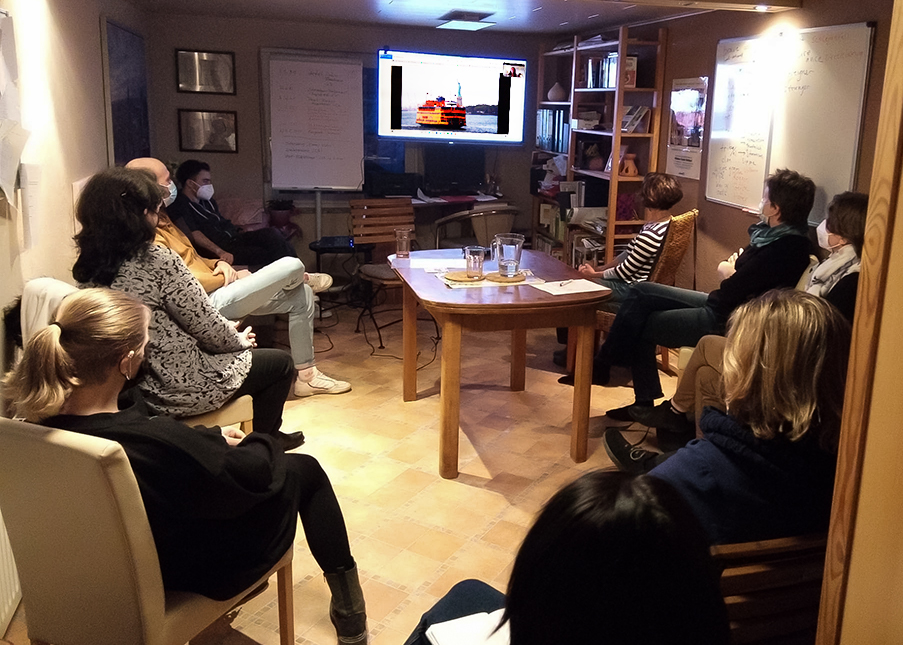
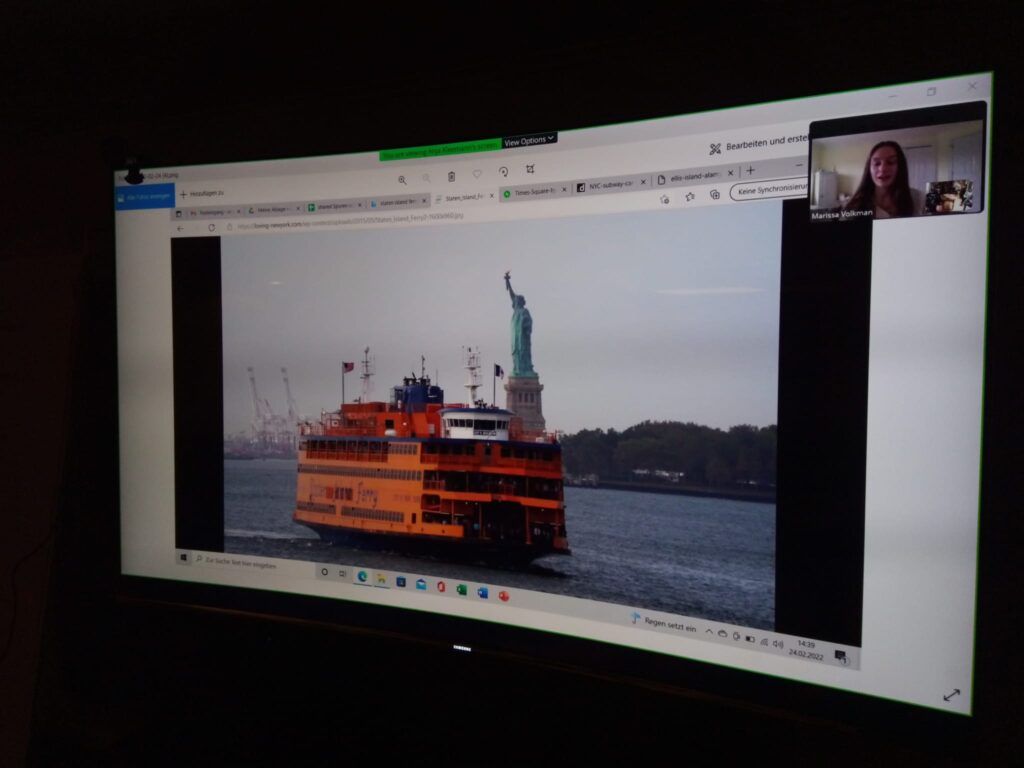
Global Salon LSZ
Cellar Tour
On 17 February 2022, during our English Course – or as we like to call it: The “Global Salon LSZ” – our Workaway-volunteer Edison took over the lesson to lead discussions about questions frequently asked by foreigners regarding Germany. One of the topics which offered a lot of room for different theories for instance was our comparatively low birth rate. Afterwards our lovely salon member and city guide Anja took some of us on a tour through the vaulted travertine cellars under Bad Langensalza! It was spooky, spider-y and exciting!

The Global Salon in
Bad Langensalza (“LSZ”)
Since the 4th of November 2021, the Haus der Spuren hosts every Thursday evening an English-conversation “course” that isn’t one: Instead, under the rubric of bringing locals together to refresh and practice their English-language skills, we explore as a group a series of other cultures: for example, Edison from the Philippines and Demetre from Georgia spoke about their native countries; Anja and Michael “reported live” from New York. As this series continues, it will offer travelogues, programs about other lands and cultures, historical reviews and the like.
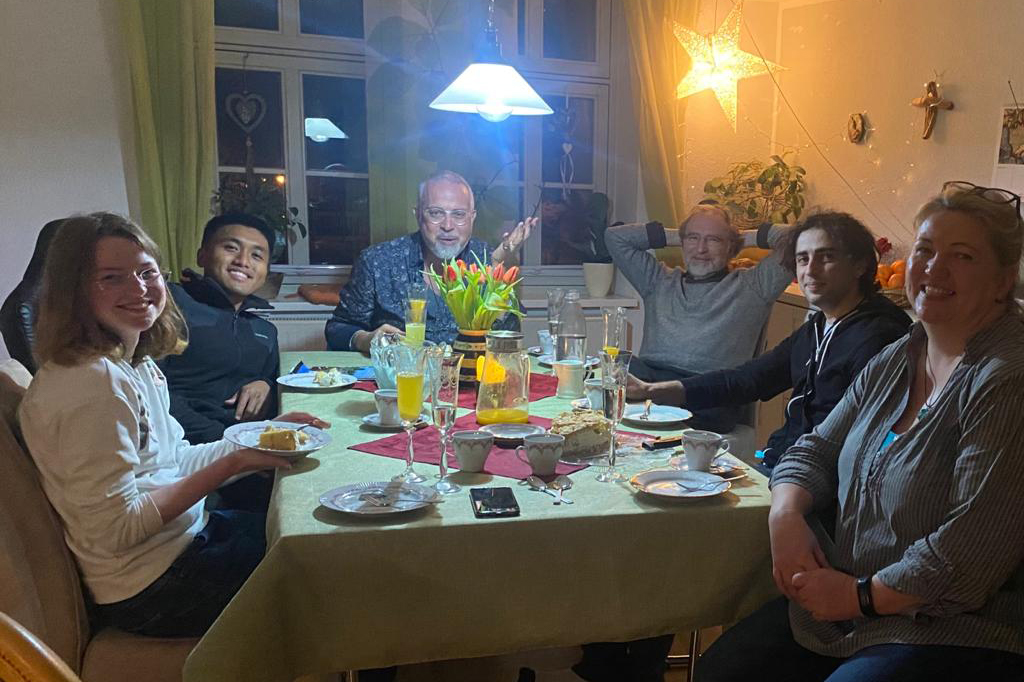
Spuren and Bad Langensalza’s City Museum
Organize Project for Students:
Looking at the German Civil War
from the Perspectives of Witnesses
Bad Langensalza, home to TRACES’ German partner association Spuren e.V., has become an important part of the German Civil War’s history due to having been the setting of the Battle of Langensalza on 27 June 1866. Therefore, it is of great importance that young and old engage in learning about this life-altering event.
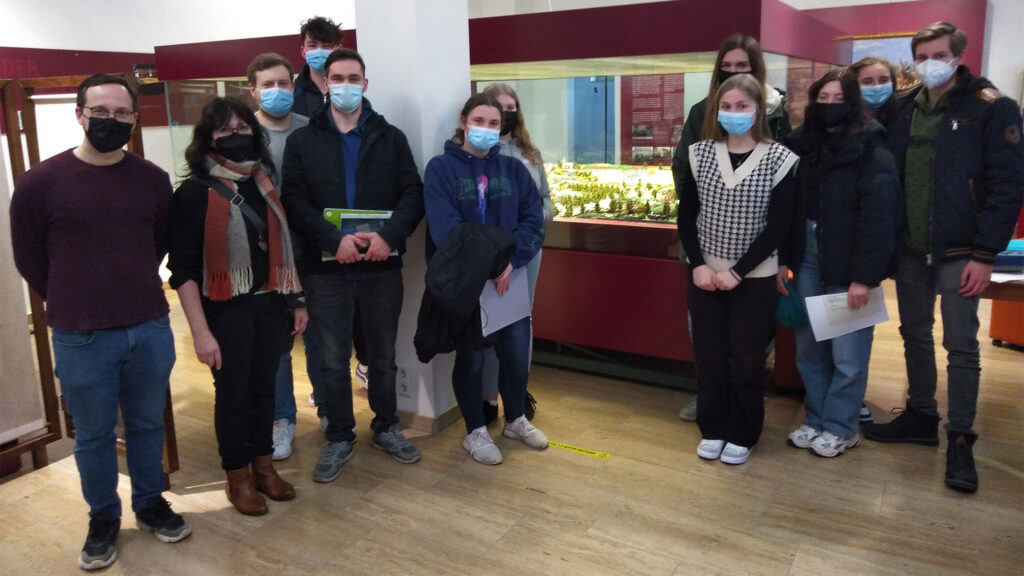
Dr. Michael Luick-Thrams, who founded Spuren e.V., collaborated with the local city museum’s director Stefan Schuchardt to push education about this matter forward. Together they set up a two-part project, which took place on 25 January 2022 as well as 1 February, during which they invited the eleventh grade students of the Salza High school to the museum and presented them with facts about the battle and its lasting impact on the history of Germany. Afterward, the pupils were given the task of writing about the battle from different perspectives. Based on a witness report, they covered it from the perspective of an involved soldier, his mother, a contemporary journalist, as well as a historian. That way they had the chance to look at this piece of history from a social angle and try to grapple with just what might have been on the minds of the involved back then.
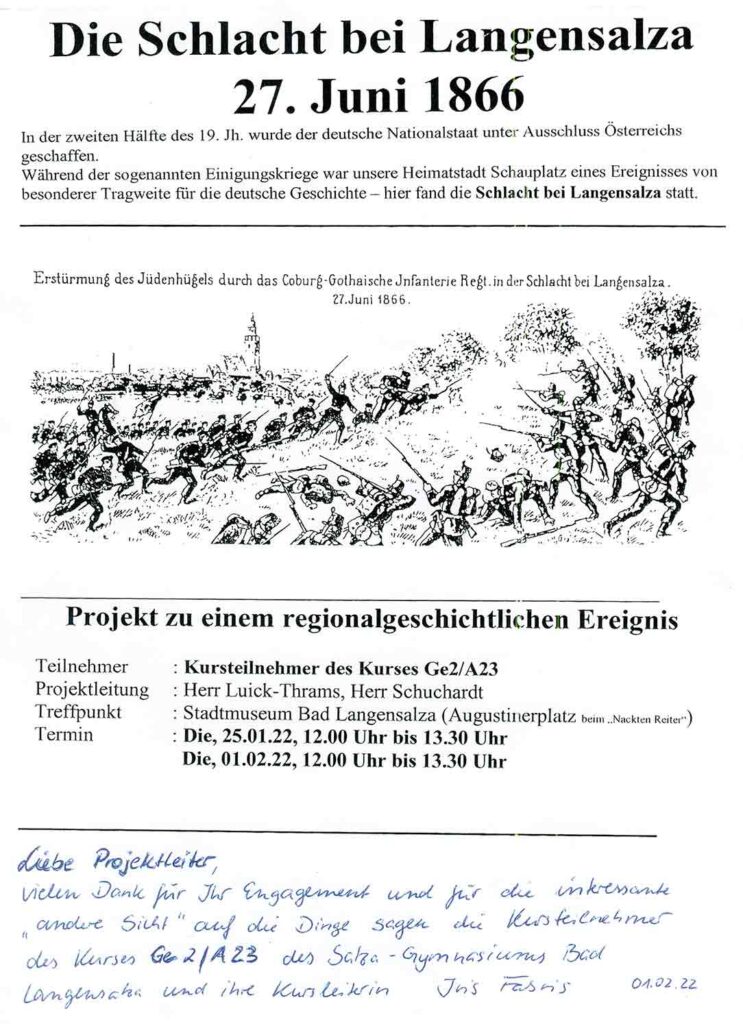
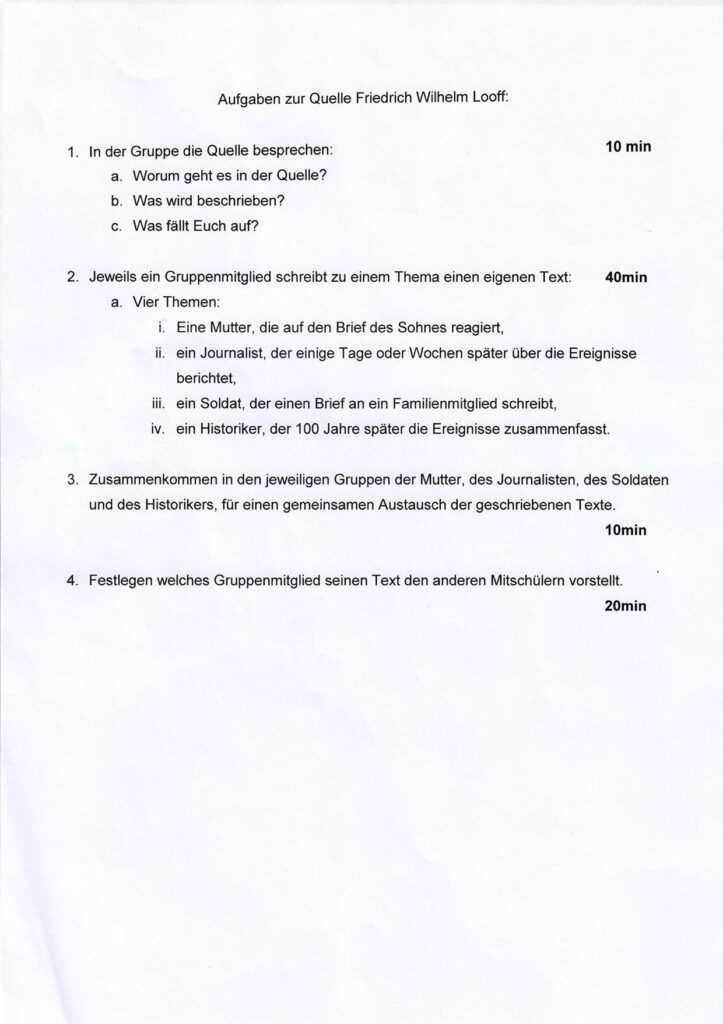
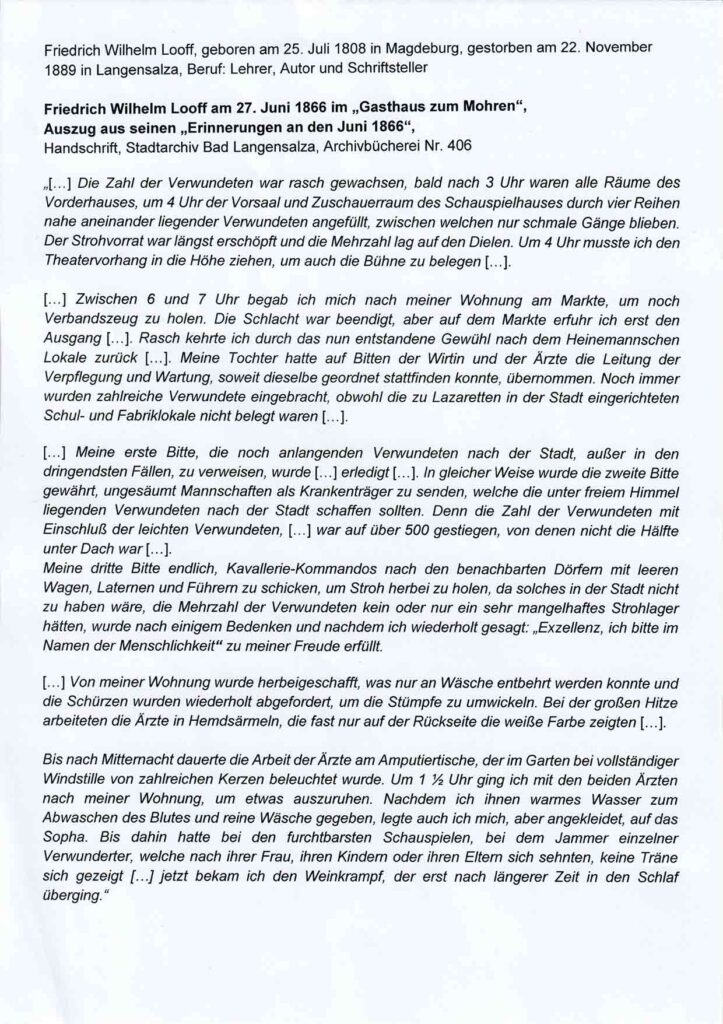
International Volunteers Teach 5th Graders
during Special School Lessons
It is important for children to already get to know different people and cultures at an early age. This is why Spuren e.V. organized a special event for two classes of fifth-graders at the Friedrich-Ludwig-Jahn-Gymnasium Großengottern on 31 January 2022. Two of the association’s volunteers, Edison Miguel Capulong from the Philippines and Demetre Chinchaladze from the Republic of Georgia, visited the pupils and created interactive school lessons for them.
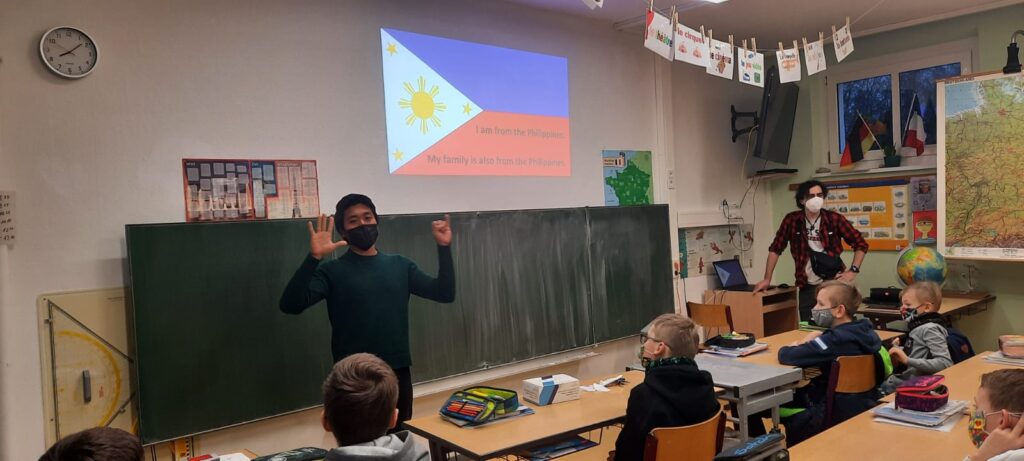
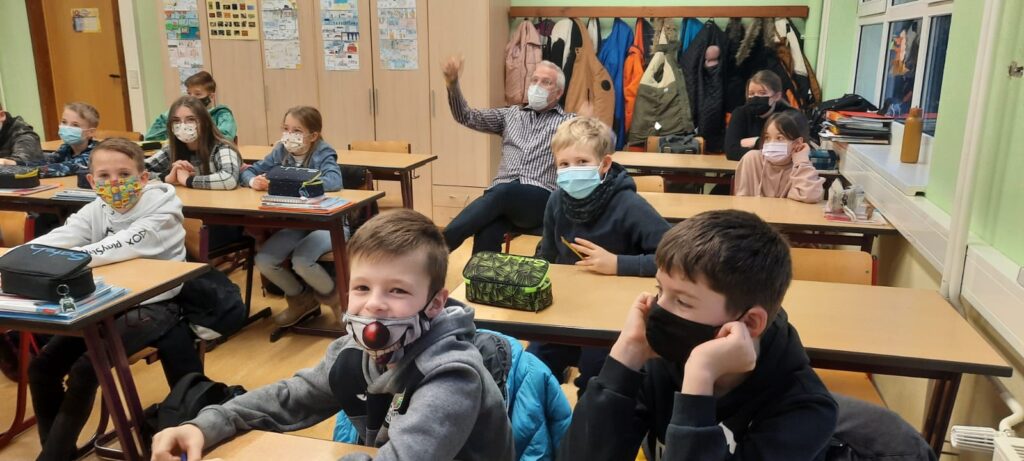
The two young men told them exciting facts about their home countries, including sports, climate, and geography, underlining it with a PowerPoint presentation full of beautiful pictures. They satisfied kids’ curiosity by leaving room for Q&As. Appropriate to the lesson’s topic, Edison and Demetre taught in English. Since the students are of course no English experts, Dr. Luick-Thrams and Edison, who has previously worked as an English teaching assistant in Madrid, made sure to give them the time and proper explanations to process the new vocabulary they have learned.
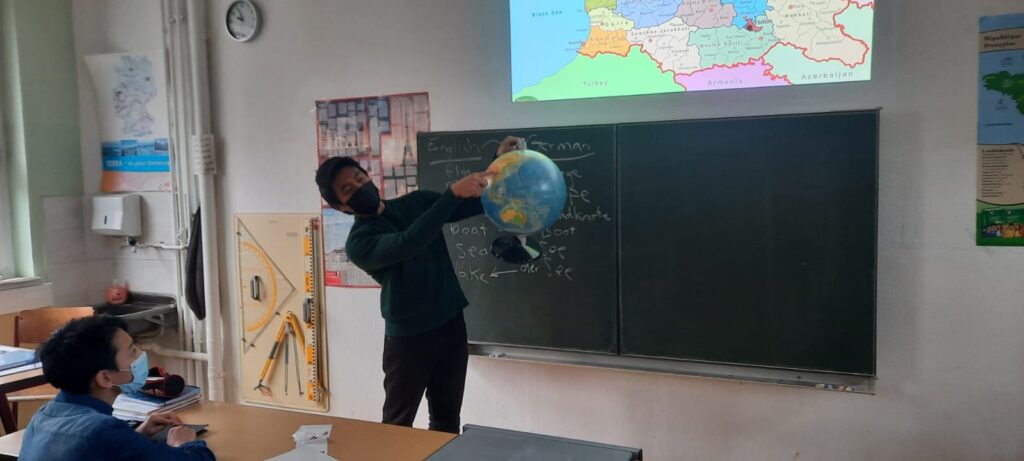
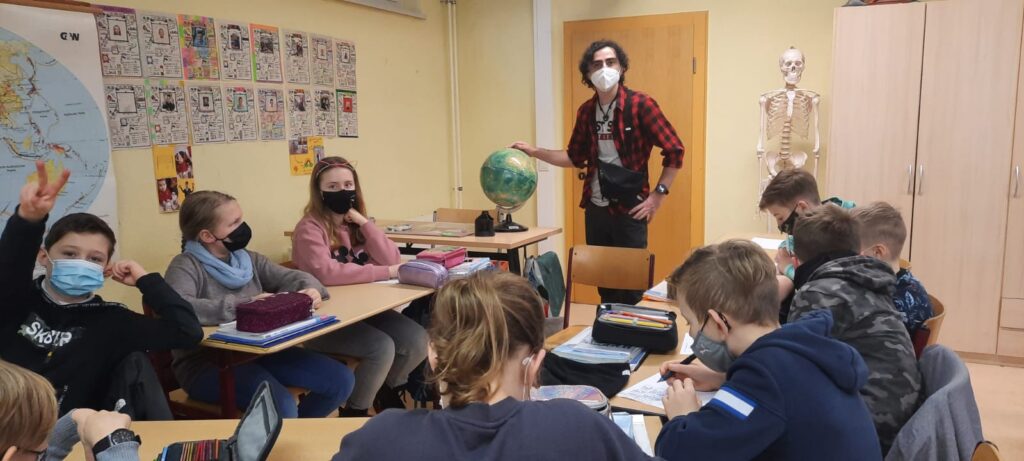
The fifth graders enjoyed our visit and we hope that they could take away a lot from it!
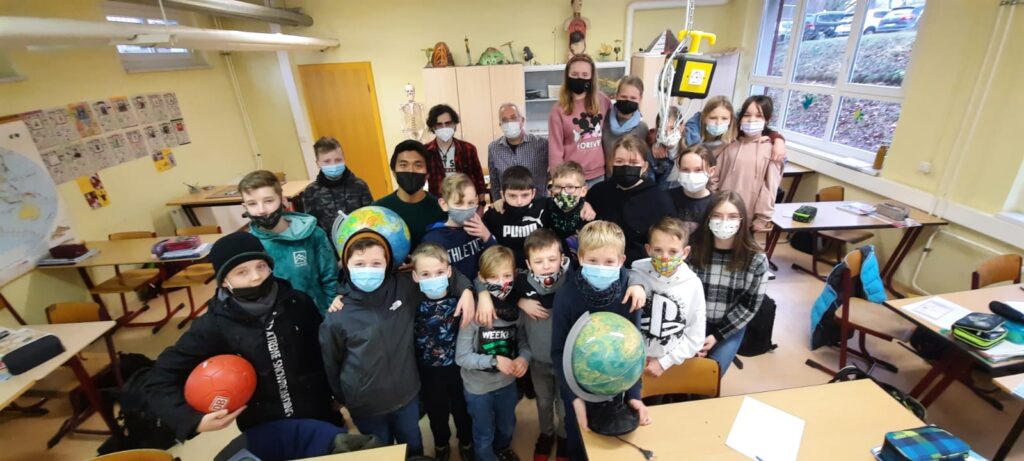
The Global Salon EF:
CORONA Edition
The following entry shows a photo from 26 January 2020 of English-speaking expats living in Erfurt, having just chewed on intellectual sustenance provided in an elaborately illustrated and narrated PowerPoint presentation by Anahita Arian–and just before chewing our way through a buffet table filled with post-presentation delights. Nowadaze, such a casual, physically-close gathering is only a dream, nay a mere mirage of “What Once Was”… Too soon thereafter, we ceased meeting–until, that is, we dared to meet (relatively “distanced”) on a sunny Friday early evening on 12 June 2020. Decimated by understandable fears of contagion, here is a scene of the few brave souls whose hunger for social contact and intellectual stimulation was still (or “again”?) greater than our fears… oh, and not to mention our hunger for non-German food!
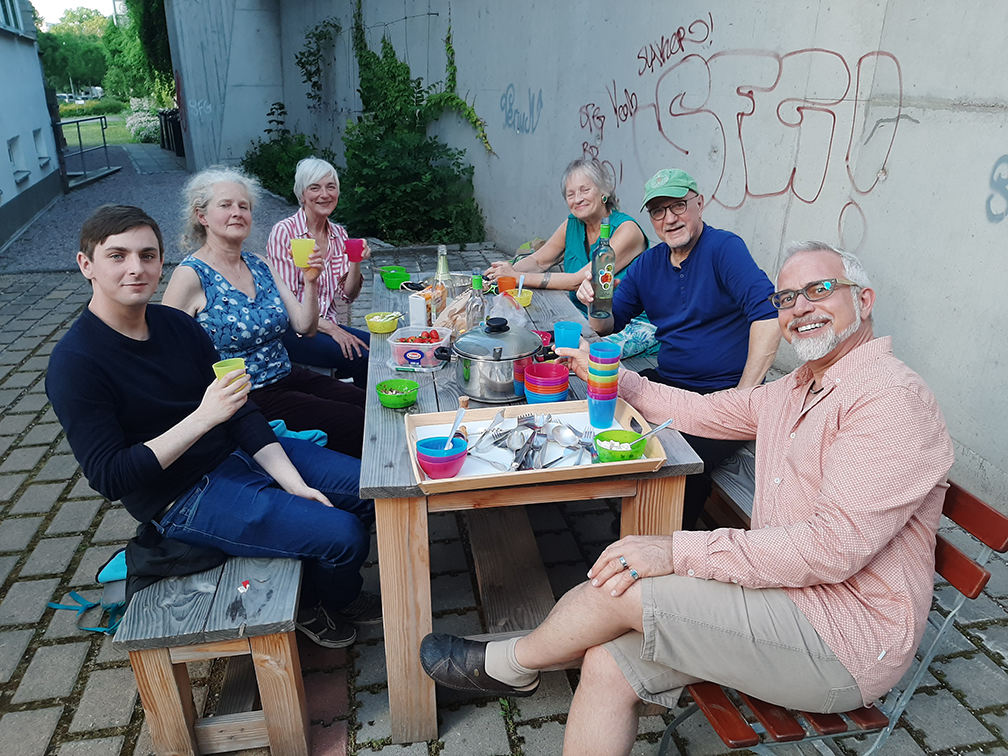
Going forward, we know now not, when we once again shall gather in such pursuits… but may it be very soon…
The Global Salon
in Erfurt (“EF”)
Before World War I, the most English-speaking expats living in Europe resided in Paris; after that, Dresden: The “Florence on the Elbe” catered to them with a score of English-language newspapers, bookshops, cafés, social clubs, gravestones… even an Anglican, a (Scottish) Presbyterian and an “American” church. Sadly, three-quarters of a century of war, dictatorship and the Iron Curtain killed Anglo-American culture in eastern Germany.
Now, in Thüringen, however, we’re changing that…
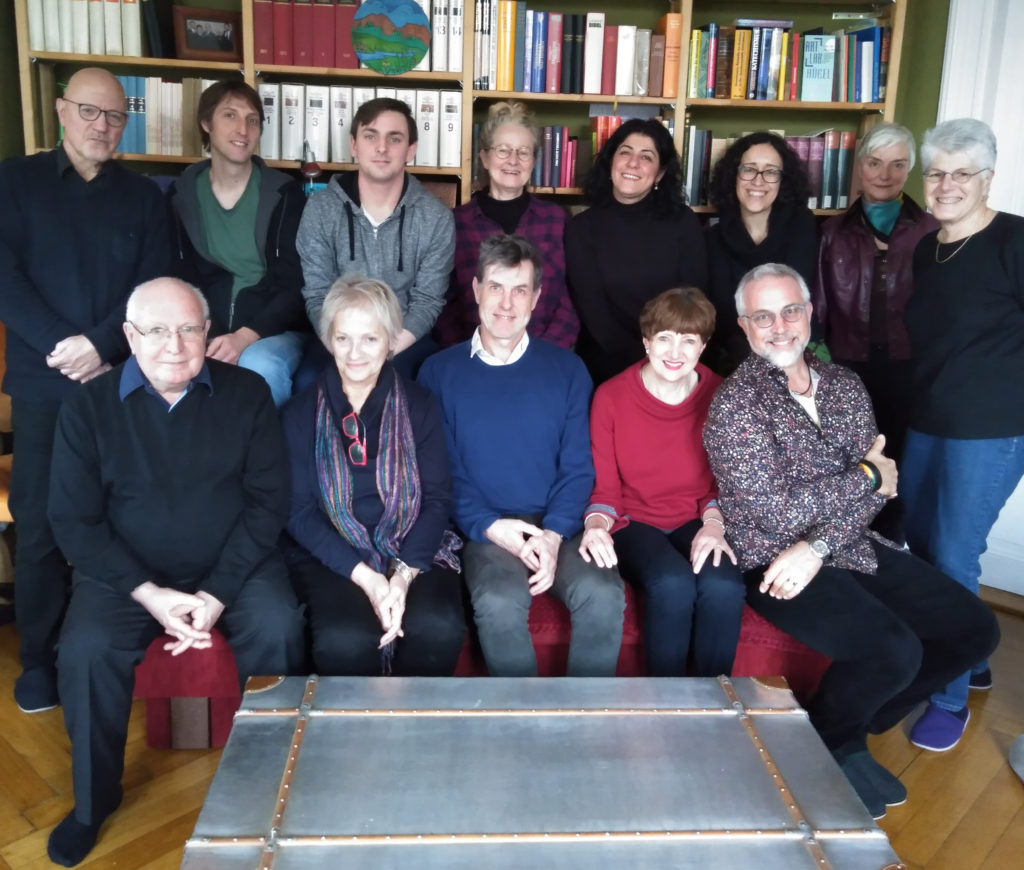
Fifteen expats attended Anahita Arian’s presentation “The 17th-Century Safavid Diplomatic Envoy to Siam: A Politics of Knowledge Formation” on Sunday, 26 January 2020. They included, in the back row, from the left: Tim (Texas), Jeremy (Ontario), David (Ireland), Lelah (Ontario), Anahita (Iran and the Netherlands), Carolina (Spain), Sabine (Erfurt) and Shelley (California and New York); front row: John (Yorkshire), Barbara (Missouri), Stefan (South Africa), Marianna (Romania and Britain) and Michael (Iowa). As a group, we have lived in myriad countries, in addition to those listed: (e.g.) Turkey, South Korea, [then-extant] Czechoslovakia, France, Bangladesh, Brazil, Ecuador…
Since New Year’s Eve 2017, a group of native speakers of English in Thüringen meets regularly to build an even better life here through exchange, programs… community.
Here’s the invitation to our meeting on 26 January 2020:
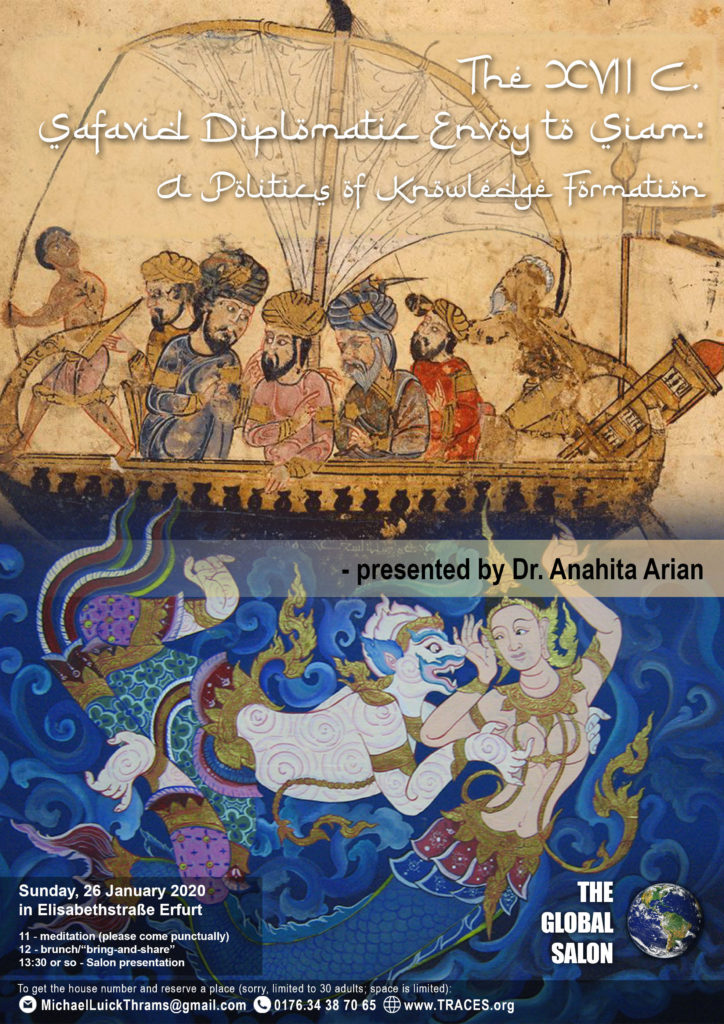
Posters about previous Salons follow:
November 2019
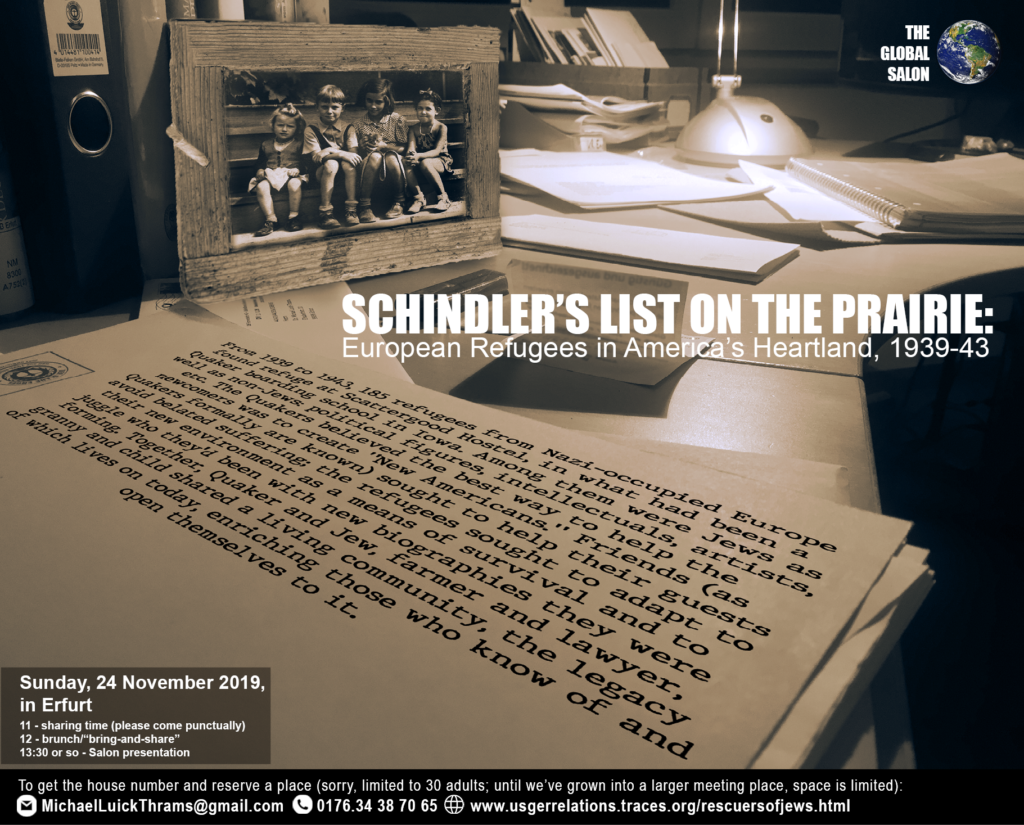
October 2019

August 2018
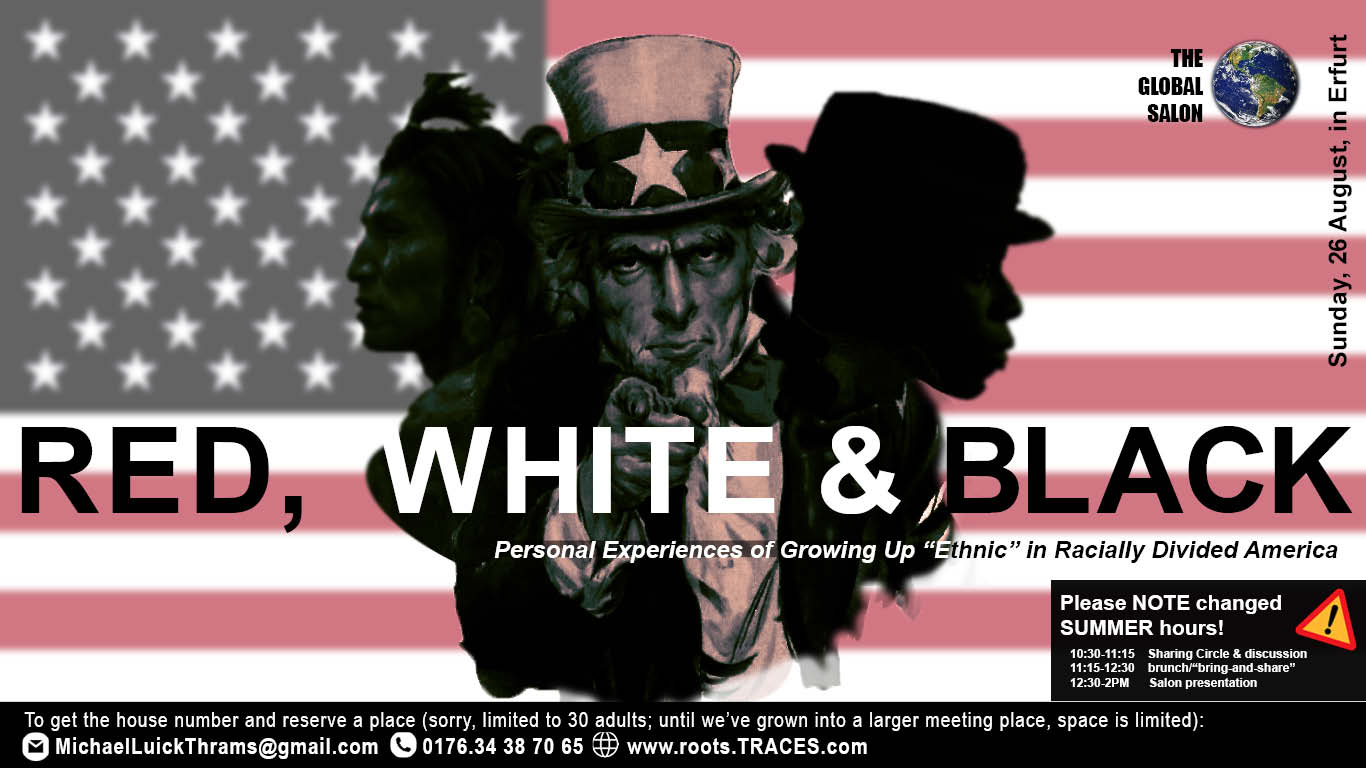
An editor at the Thüringer Allgemeine, Karsten Jauch, especially liked the idea of The Global Salon. He wrote about it in his weekly column “Kunstpause” (“Art Break”), both before its launch and, having been present at that initial meeting, about it afterwards.
_
“In Luther’s Footsteps:”
Midwest College Students Explore Erfurt
On 17 January 2020, 17 students from Luther College (Decorah, Iowa) toured Erfurt, as part of an extensive, three-week tour of Germany focused on classical music. One of their two chaperones, music professor James Griesheimer, accompanied them during their 12-hour exploration of the provincial capital, led by TRACESpuren director, Michael Luick-Thrams.
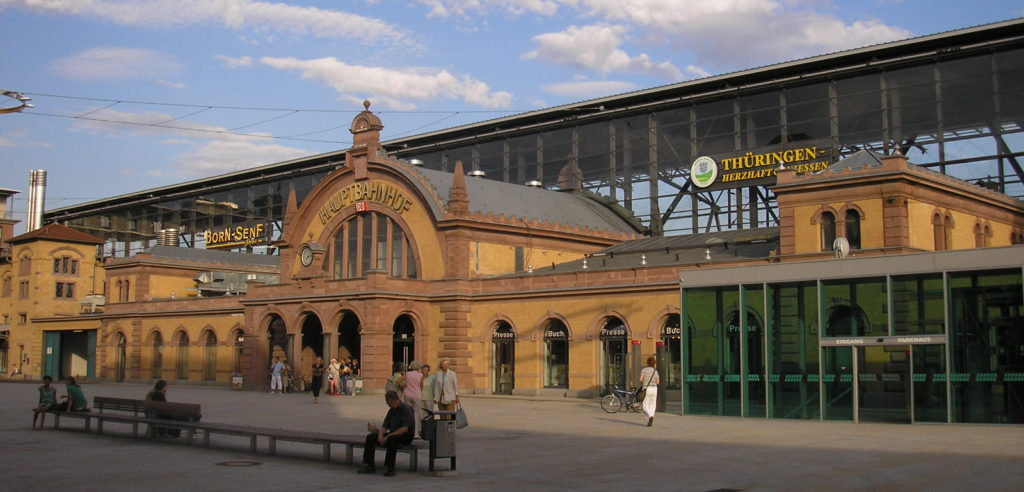
After a greeting and quick orientation in front of the Hauptbahnhof, the students explored Thüringen virtually at the regional visitor center opposite the main station:
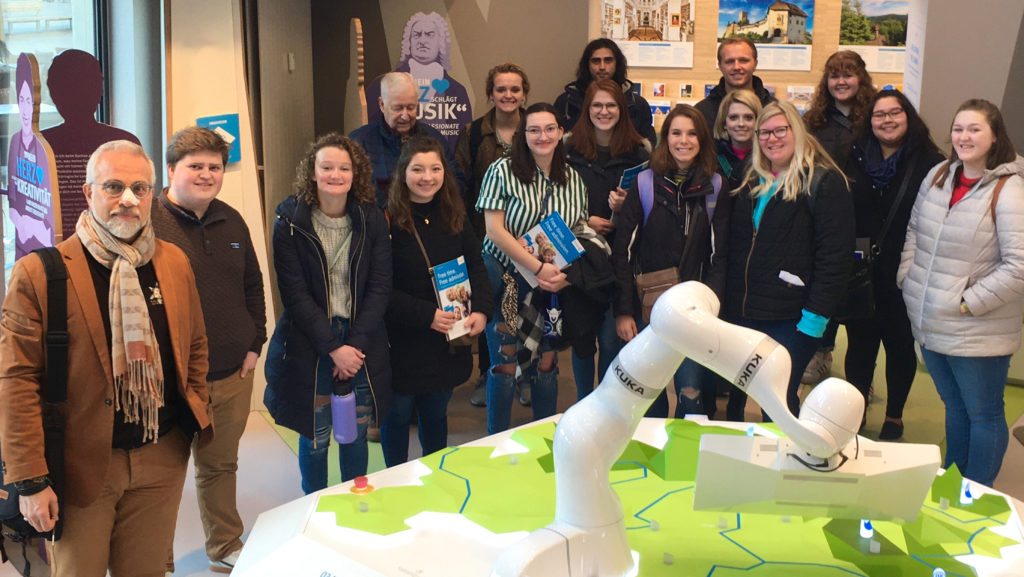
Local-guide Michael Luick-Thrams, freshly operated on to remove cancer, and some of the freshly-arrived Luther College students, viewing the “360-Degree Discover Thueringen Digitally” display in Erfurt, the capital of the province of Thueringen
Then, their rigorous discovery tour through the ancient city began in earnest:
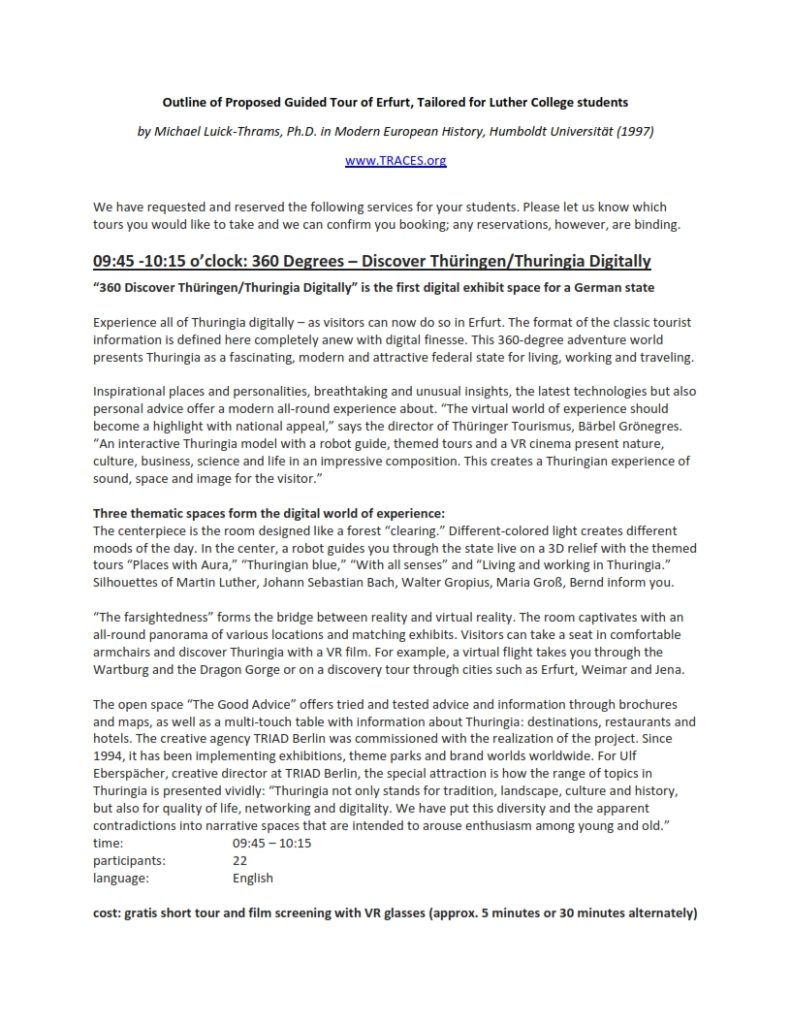
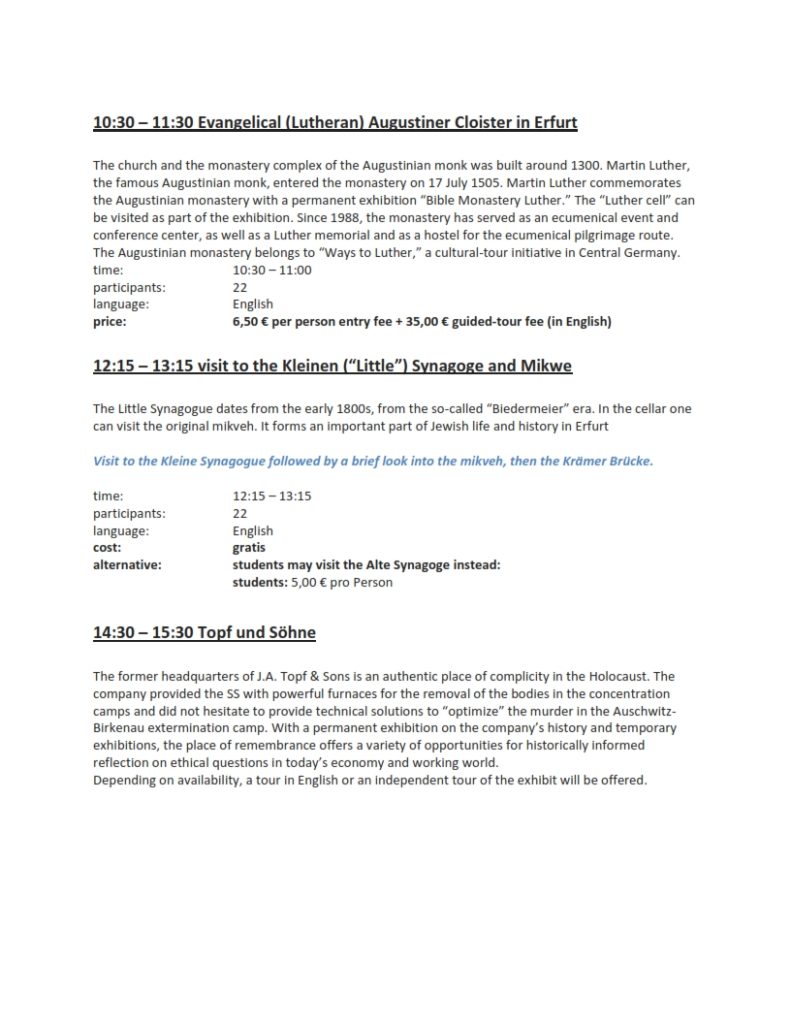
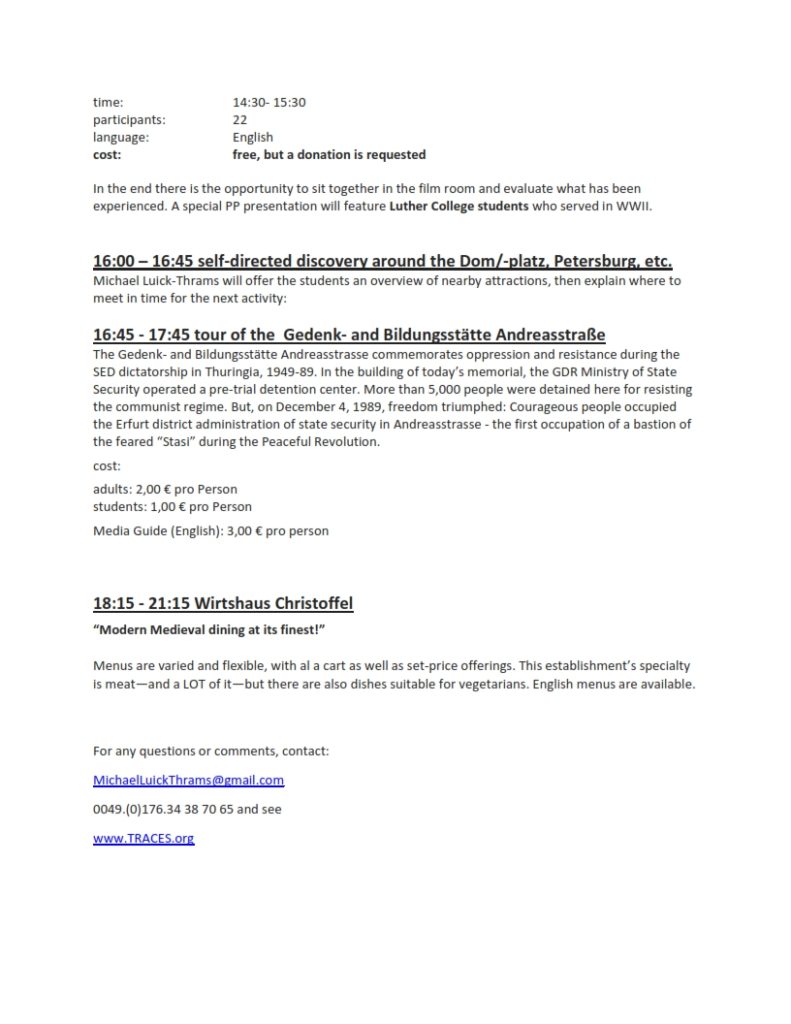
The afternoon’s itinerary included a visit to a Holocaust memorial site, Topf & Söhne, the factory infamous as the “maker of the ovens of Auschwitz.” Special to their tour, the students took turns narrating excerpts from Luther College students who fought in World War II—which proved to be exceptionally meaningful to these contemporary students.
“The War Correspondence of Luther College’s Student Soldiers“
download: PP presentation (pdf) or script (pdf)
That evening, following a self-guided tour of the Andreasstrasse STASI-prison memorial, all involved appreciated “lighter” fare for dinner—a Medieval dinner banquet in the arched-ceiling cellars of Wirtshaus Christoffel:
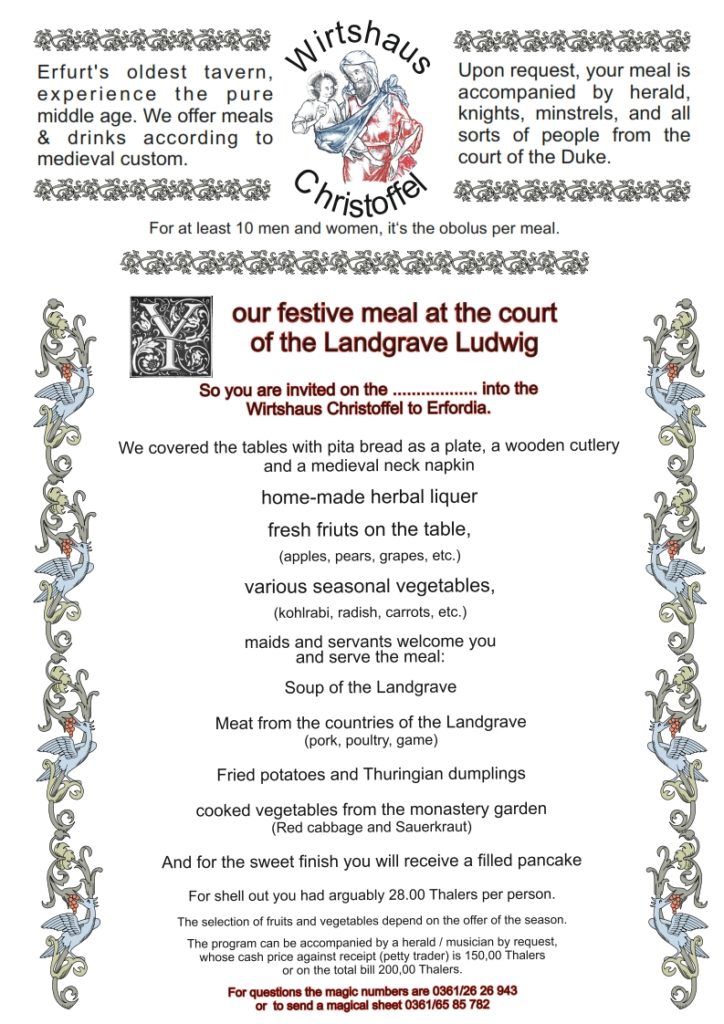
The students and their local guide ended the evening with a view over Erfurt’s Altstadt [“Old City”] from the Stadtpark, the “City Park” on a hill on the backside of the Hauptbahnhof. Sad to see the students go even before they departed per an ICE fast train to their hotel in Eisenach, Michael Luick-Thrams stayed in contact with the students intermittently for the rest of their trip—including, on the day of their tour of Dachau, sending them both a film of American soldiers liberating the camp as well as a link to photos taken of the camp by some of the Midwest soldiers who supplanted Nazi rule there.
_
Celebrating the Haus der Demokratie +
the 70th Anniversary of German Basic Law:
” – And What’s That Got to Do with Me?”
Projektwoche – 2019

son Christian Krauter (left) with his mother Anneliese,
and Michael Luick-Thrams; Meiningen, 1 October 2019
From 30 September to 2 October 2019, pupils at Regelschule “Am Kiliansberg” in Meiningen (Thüringen) considered their own families’ roots and experiences by exploring those of others. Michael Luick-Thrams presented to them stories from German-American history as background for special guest Anneliese (née Wiegand) Krauter, who came all the way from Indianapolis to share her story with the pupils:
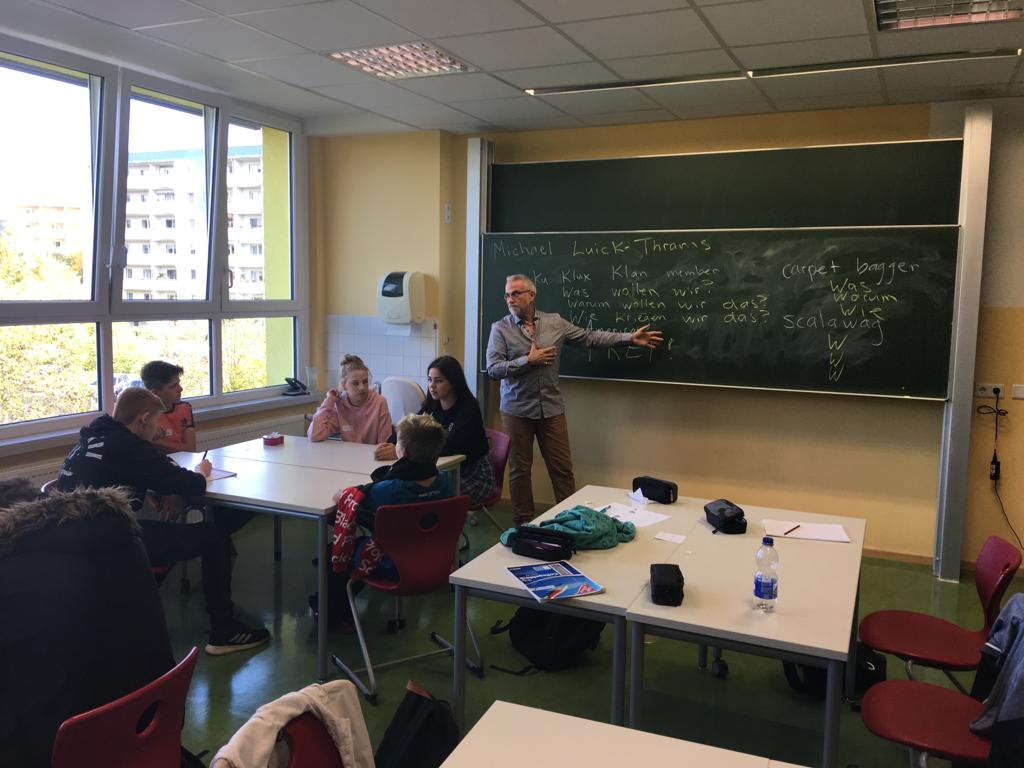

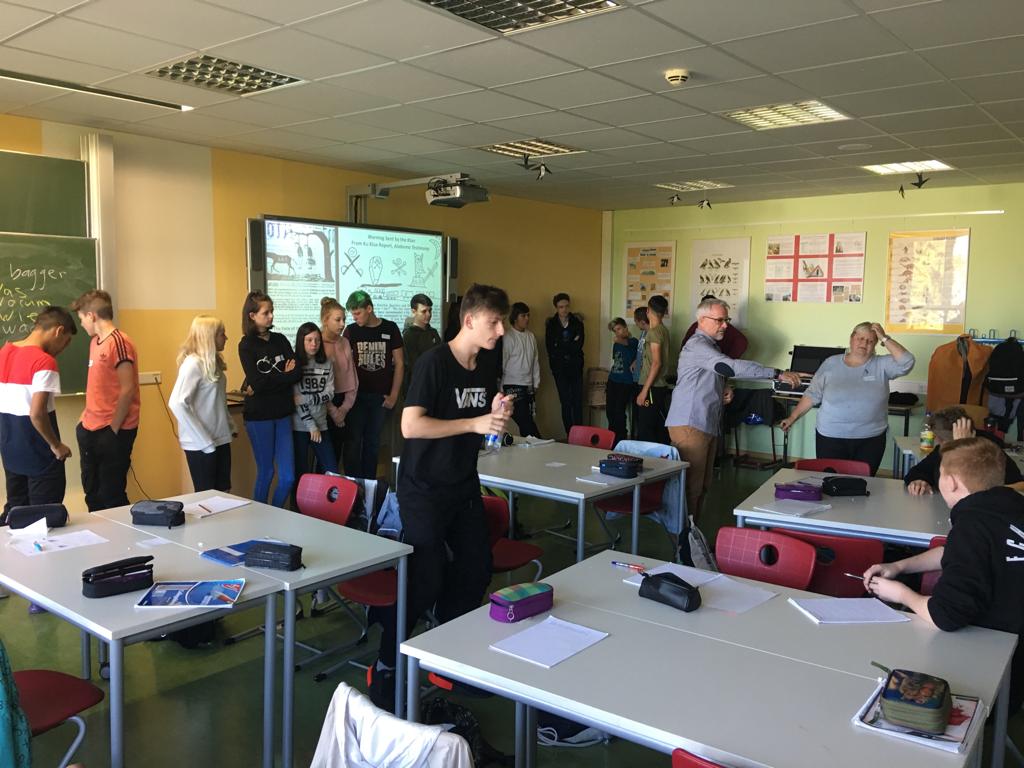
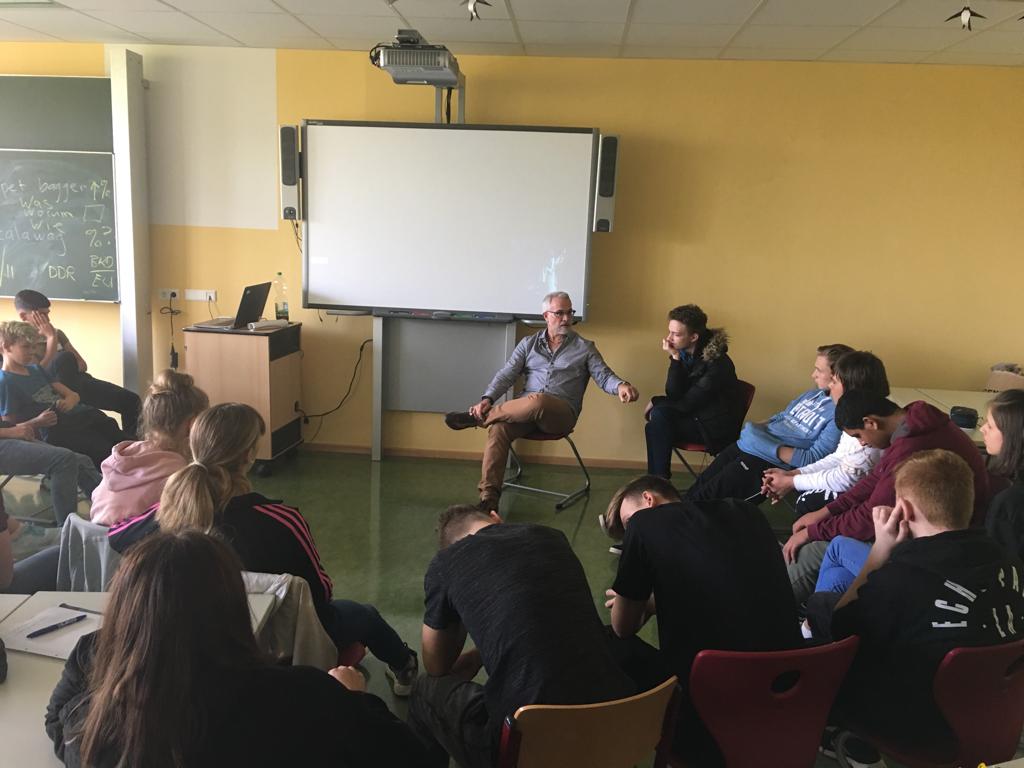
It was wartime on the US home front. She was an American—wasn’t she? Anneliese had been born in New York, of German-immigrant parents (one already naturalized, one awaiting that). As citizens, the eight-year-old girl, her older brother Freddie and her Waldorf-hotel salad-chef mother “should” have been guaranteed due process when “Lee’s” father was interned as a suspected traitor—but they were not. Instead, they “voluntarily” took residence at Camp Crystal City, until they, too, were “repatriated” and forcibly sent to Europe, where the family was traded for Axis-held US nationals… and then the Wiegands’ adventure really started! It took them to Anneliese’s father’s hometown of Meiningen…

caption written by Anneliese (left): “Xmas 1942 family pic we sent to Pappi
while he was in internment camp” near Bismarck, North Dakota; the
photo shows Anneliese, mother Alma (née Wiedrich) and brother Freddy
…where the Kiliansberg pupils used Anneliese’s fascinating story as a launching point to write their own. They presented the products of their work to the larger school body at a special program, shown here:
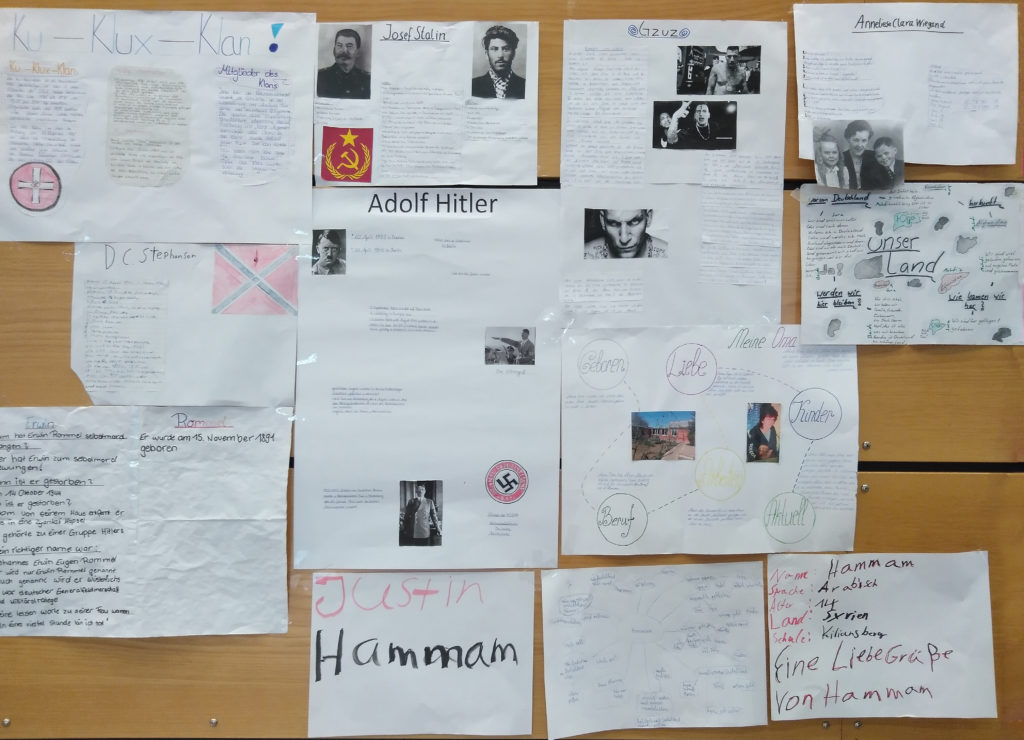
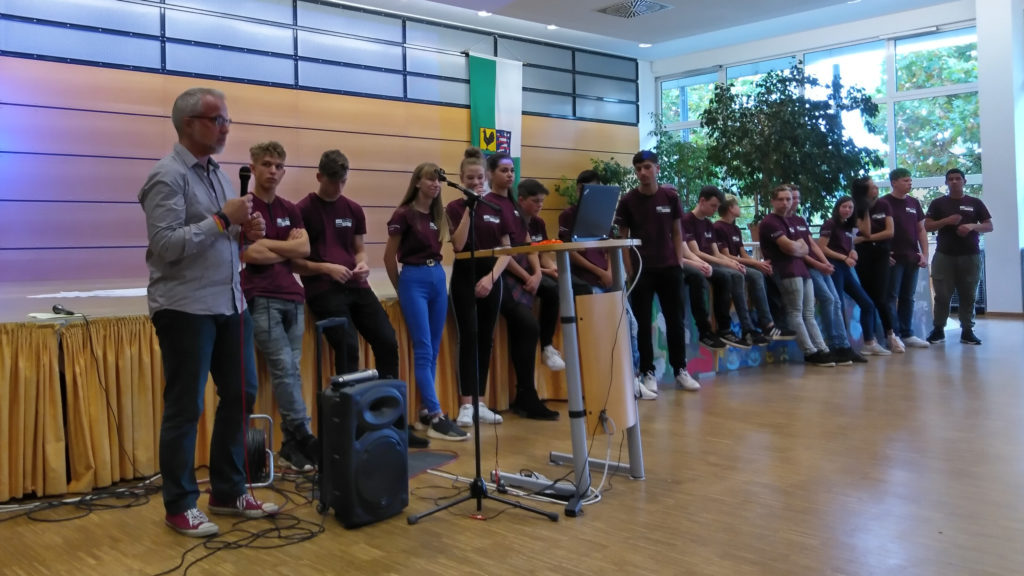
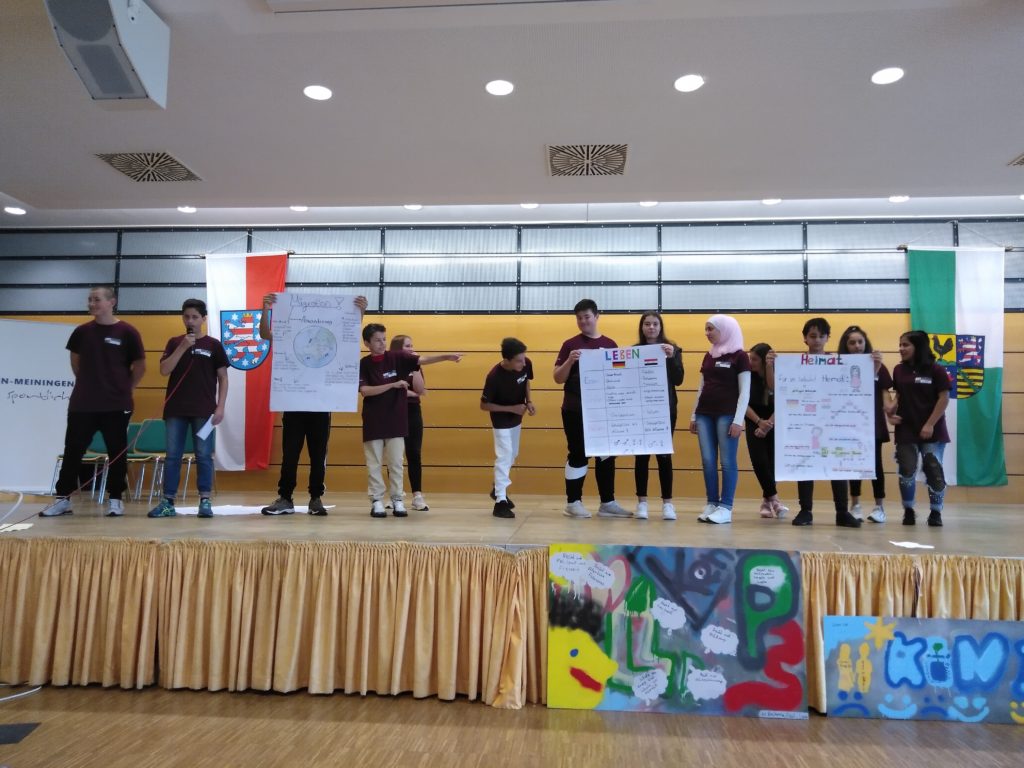
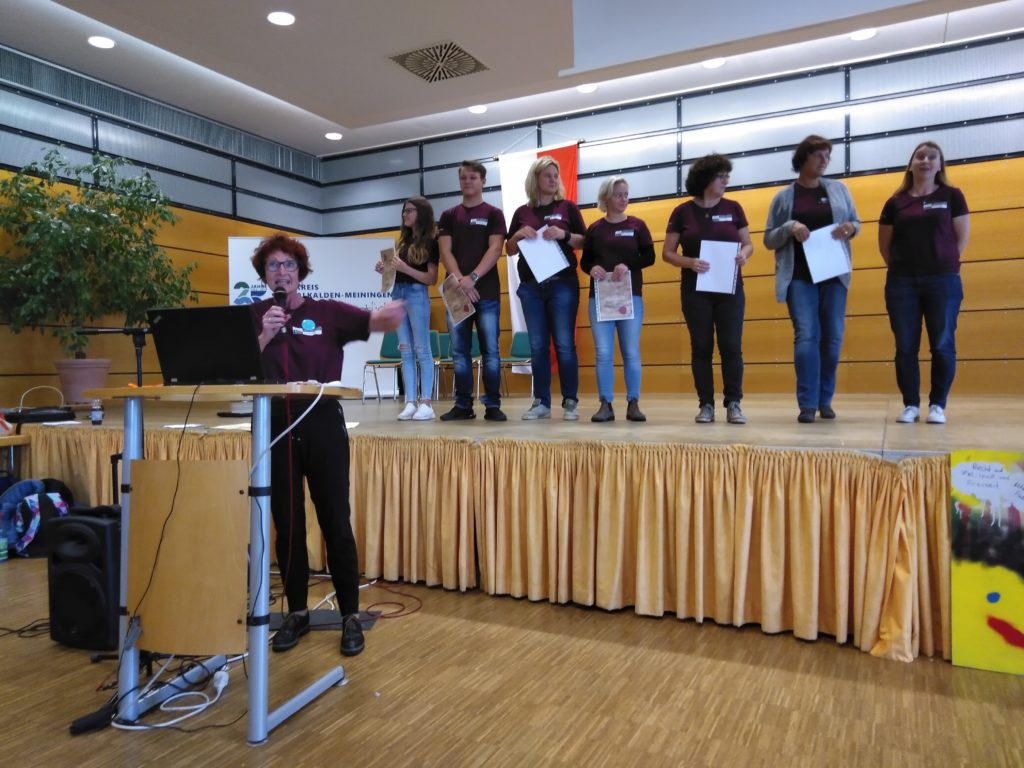
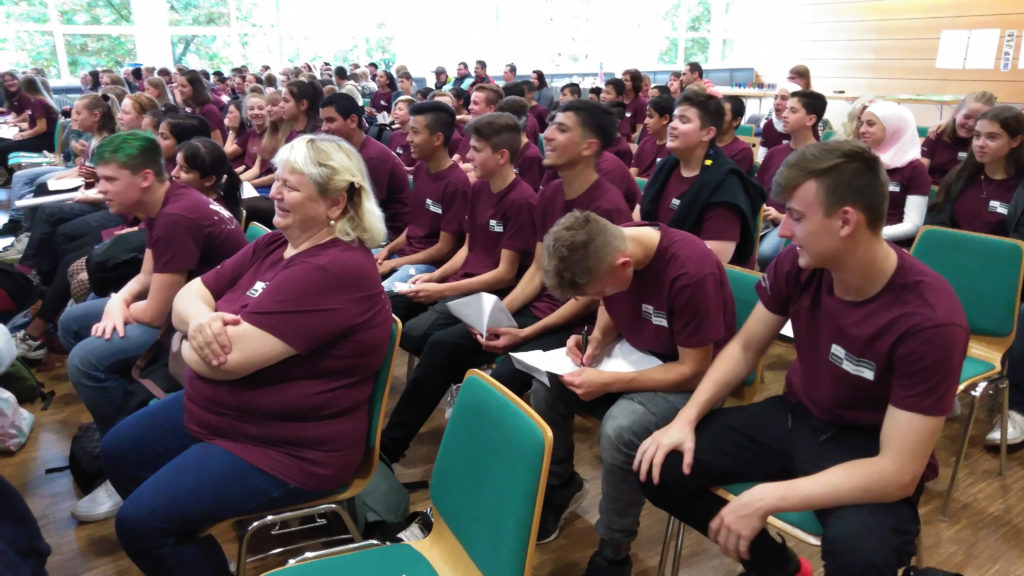
_
“Our Hometown’s Becoming More Colorful!”
Images of Our City – 2019
At the Erfurt Schiller School as well as at the Community School am Roten Berg in Erfurt several days on on-site projects under the motto “ Our Hometown’s Becoming More Colorful!” in August, and September and December 2018, carried out with the aim that the students become more aware for their fellow human beings and to more sensitive to how they treat them.
Kevin Manygoats, Greg Mock and Dr. Michael Luick-Thrams each spoke about and showed pictures of their childhood and their families (respectively) on a Navajo reserve in Arizona, in an “inner-city colored ghetto” in Philadelphia, and on a farm in Iowa, with a great-grandfather/namesake who was a member of the Klu Klux Klan—which particularly persecuted Catholics. Their very personal family stories reflected the theme “The Roots of Racism in America”. This raised questions such as: “Why are colored people, Indians or Catholics persecuted?” In concrete terms, the pupils could talk about the roots of conflicts, e.g. in the family, in a school class or on the street; they come into conversation with their guests or each other, and think about how conflicts in Erfurt today could affect their coexistence.
Palestinian Thaer Issa and Israeli Sagy Cohen reported on how they grew up in one state with an “enemy” image of the other. The pupils discussed the concept of home and what it means for them. Hatem Adi, a refugee Syrian, talked about his life before and during the war in Syria and what it meant for his family in everyday life. The students asked interested questions and learned what fears and terror he had to overcome in the war and during the flight to Europe. In the class, several immigrant students are (e.g.) also refugees from Syria. For the first time, these students told their classmates what they themselves had experienced in Syria and during flight from their dramatic experiences.
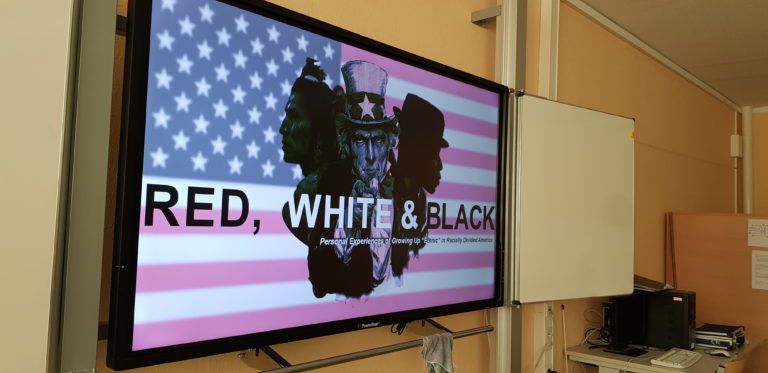
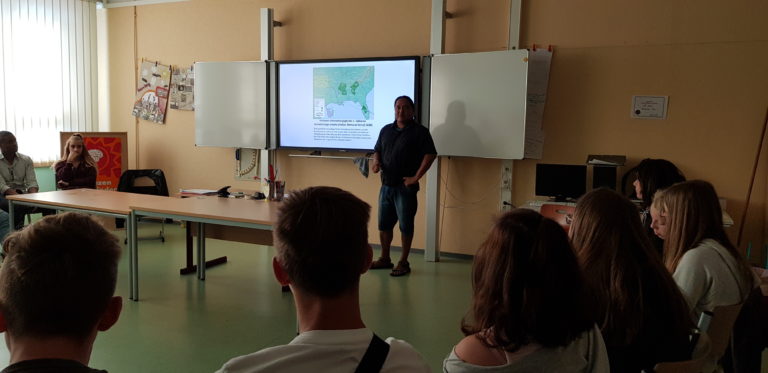
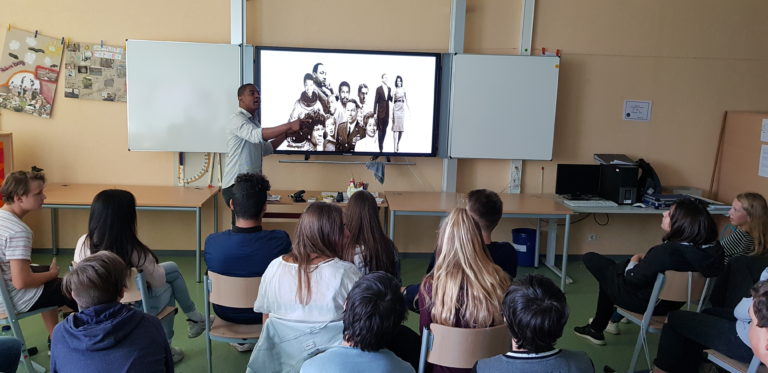
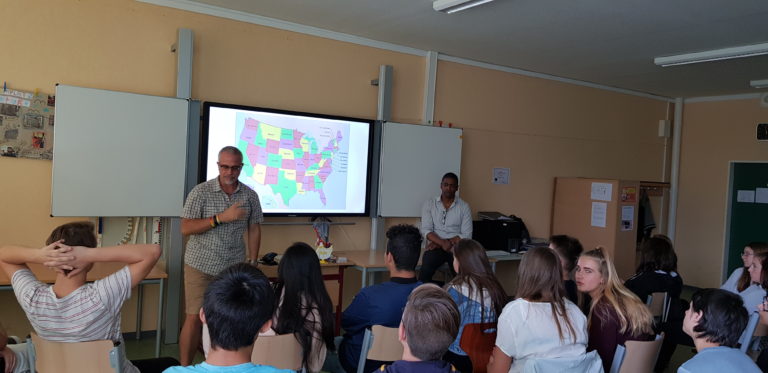
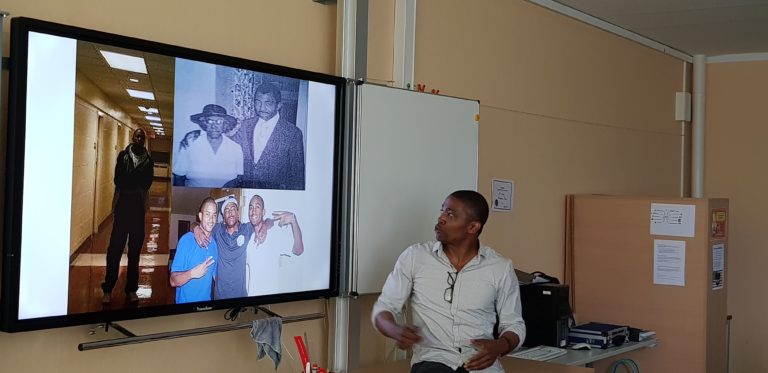
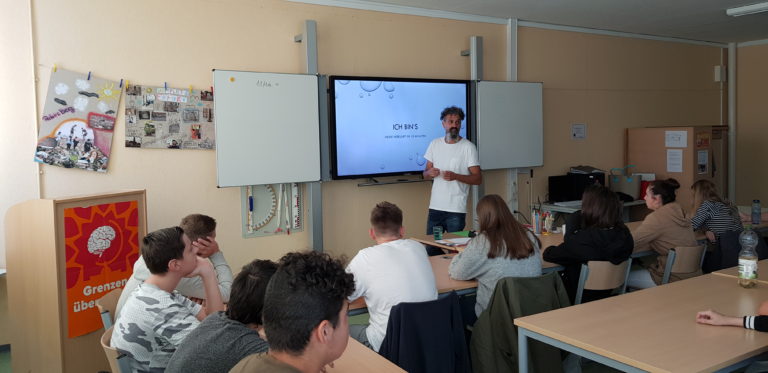
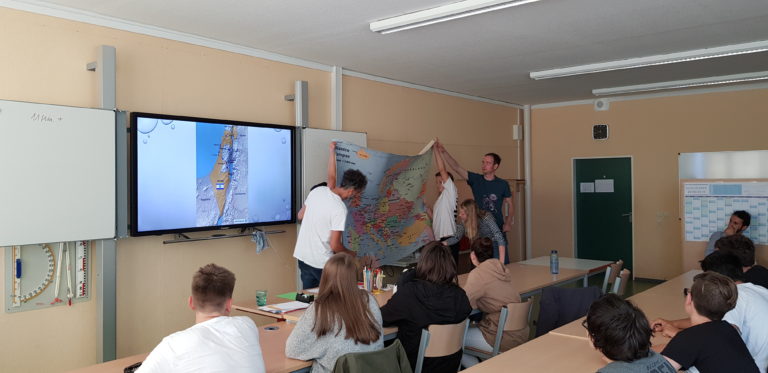


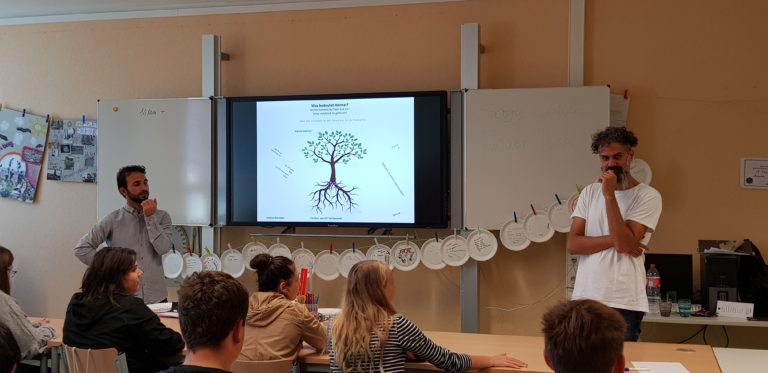
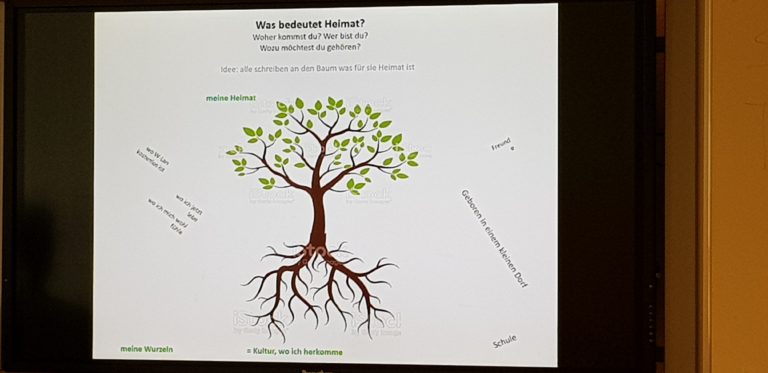
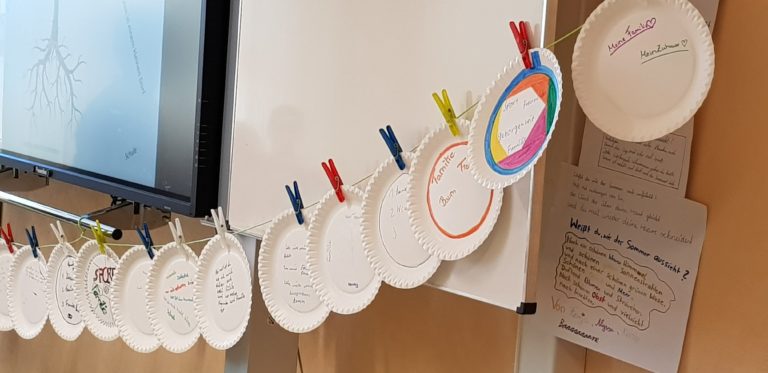
_
Nine Months, Three Powers, Millions of Fates:
Thuringian Social History from January through September 1945
We are taking an exhibit throughout the entire state of Thuringia (and, if possible, later through the American Midwest in a retrofitted school bus; click one or the other link to see examples of our previous “BUS-eums“) as a way to bring public awareness to regional social history during the first nine months of 1945, during which three contrasting systems (Nazism, “Americanism” and Soviet communism) ruled the territory and affected the lives of millions. It features first-person narratives (diary entries, letters, articles, artwork, etc.) from the time, plus recent interviews with individuals with remembrances of events from the period in focus. We invite visitors to the exhibit to record their stories, too, so that future generations can learn from them.
_
Words between Worlds
Our on-going programs continue to enrich audiences in schools, museums, religious and other organizations. Contact us to explore hosting one soon in your or a friend’s institution.
A Project that Creates Space for Encounters and
Exchange between Germans and Non-Germans
Former East Germany generally, but Dresden specifically, faces a considerable challenge at present:
few non-Germans live here. At least so it seems, as many people in the region don’t personally know any foreigners, yet fear or disdain them. And, fear breeds conflict.
Spuren e.V. has five solutions: a Malaysian Buddhist, a native Navajo, an Israeli Jew and a Midwest Quaker, a Russian Jew and erasmus-students from Jordan and Armenia.
They bring young people into direct contact with foreigners living in Germany. And, they offer pupils and their families a relaxed, non-polemical space where they can share their own stories with others.
Words between Worlds focuses not on the abstract or political but on the immediate and personal. Its co-facilitators believe that while we all live in a neighborhood, each of us first lives in a house: To make conscious our belief-driven behaviors, then confront and finally change them, we best begin at home. Thus, participants are invited to examine their origins and lives, and those of their families.
Words between Worlds is:
- an enriching experience for 9th– to 12th-grade pupils and, if hosts wish, their families
- built around a core 90-min. Power-Point-illustrated presentation for schools, churches, etc.
- able to be tailored to fit each host’s needs, conditions and resources. A visit to a school can take place as a one-time assembly, or as half-, full-day or weekend workshops, using diverse means. Depending on the audience, its main working languages can be German or English.
For more information see www.DE.TRACES.org; to apply to host or attend a workshop, contact staff@TRACES.org.
Thank you for your interest!
_
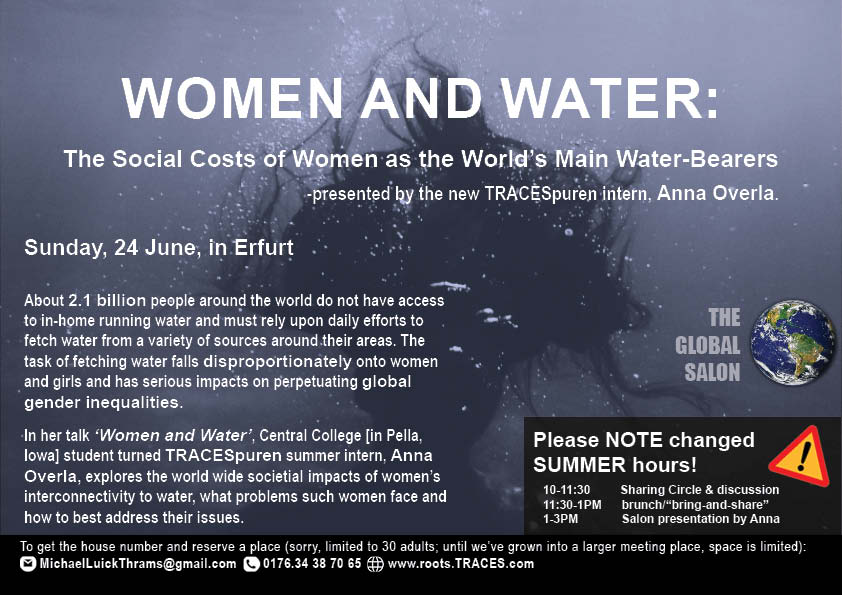
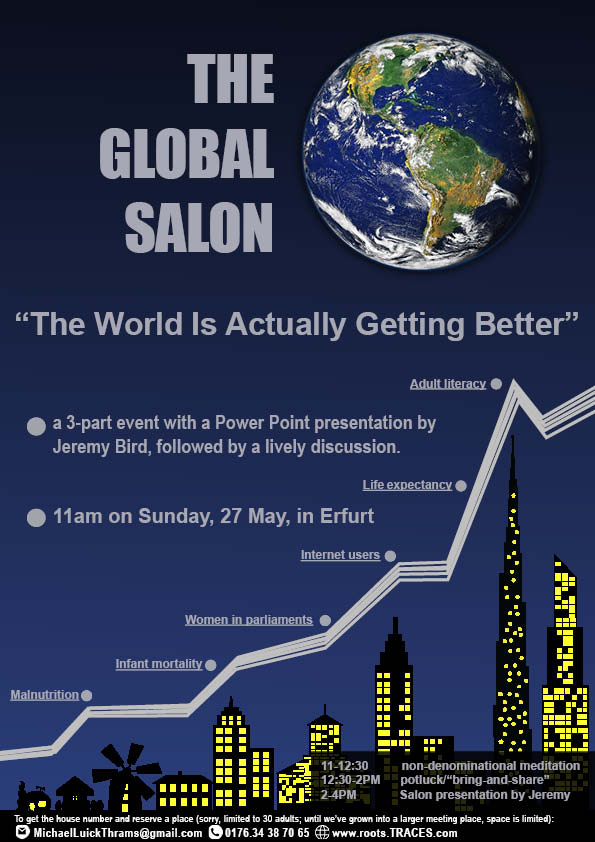
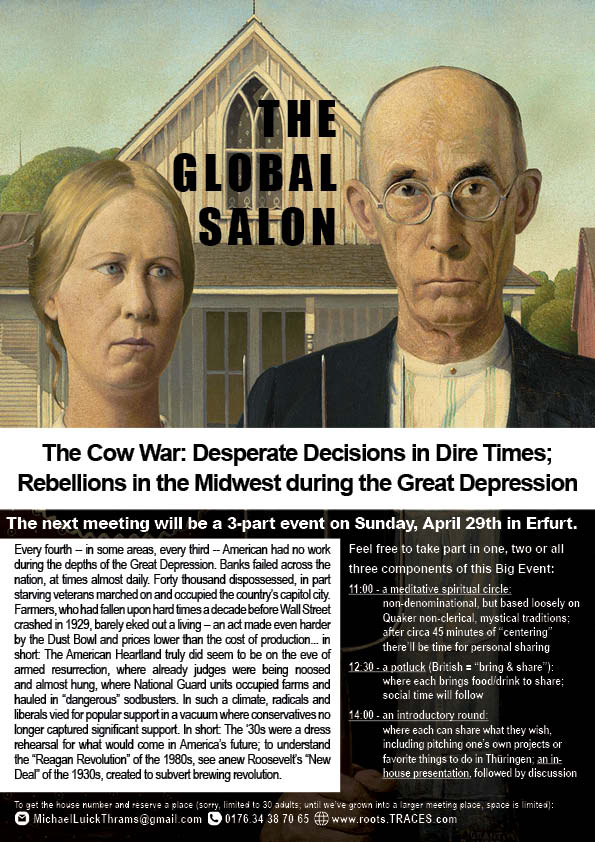
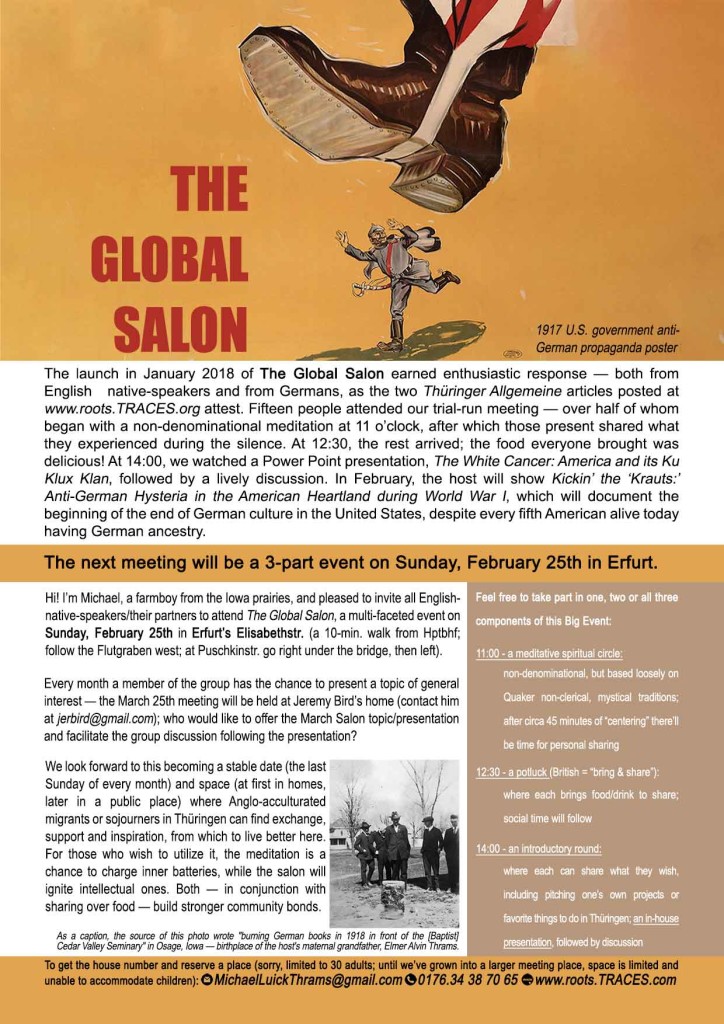
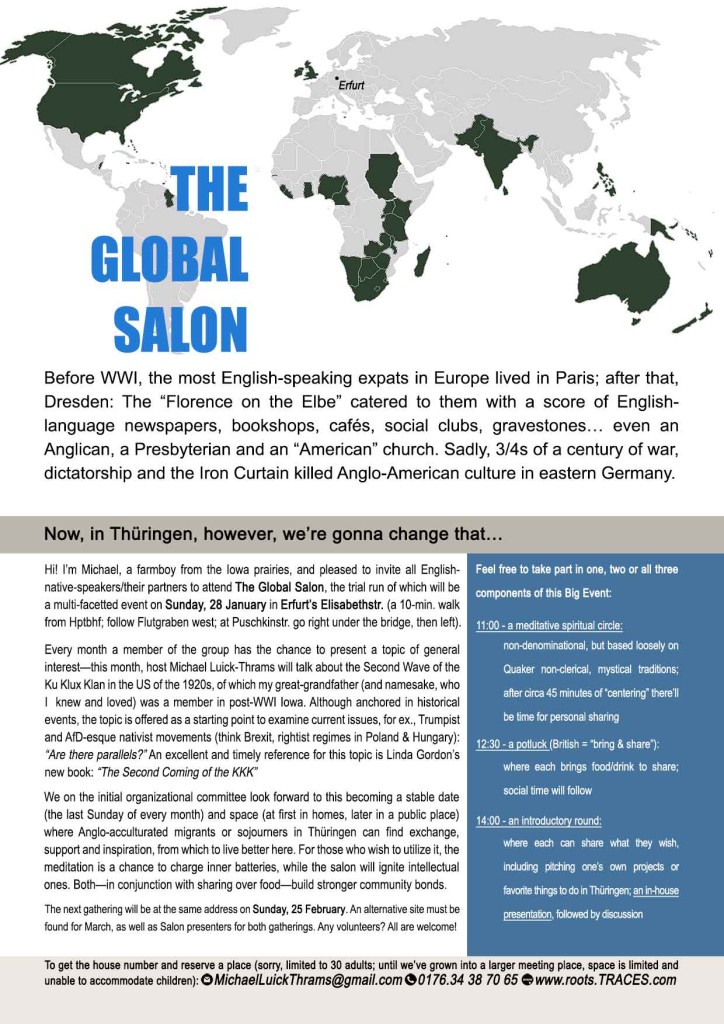
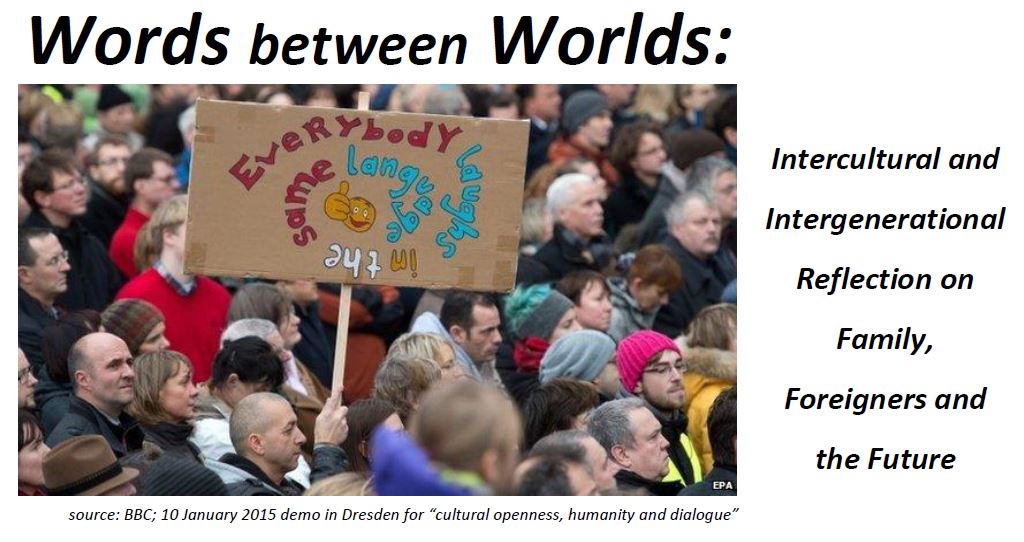
1 thought on “Programs”
Comments are closed.